Join us for the launch of our final exhibition of the academic year, exploring tabletop roleplaying games (TTRPGs).
We were delighted to host experimental exhibition Weird Hope Engines, at this first opportunity to come along for a first look around. Attendees enjoyed a free welcome drink, delicious food and music.
The first exhibition of its kind, this exhibition highlights the practices of innovative designers, artists, and writers in the field of independent game design, and brings their work into dialogue with fellow-travellers in the field of critical art practice.
We dedicate the final Vitrines instalment of our 2024/25 season – Nottingham Subcultural Fashion in the 1980s – to archive material, information and clothing that documents the dynamism of the independent fashion scene of Nottingham in the 1980s.
All welcome but reserve your free ticket to avoid disappointment.
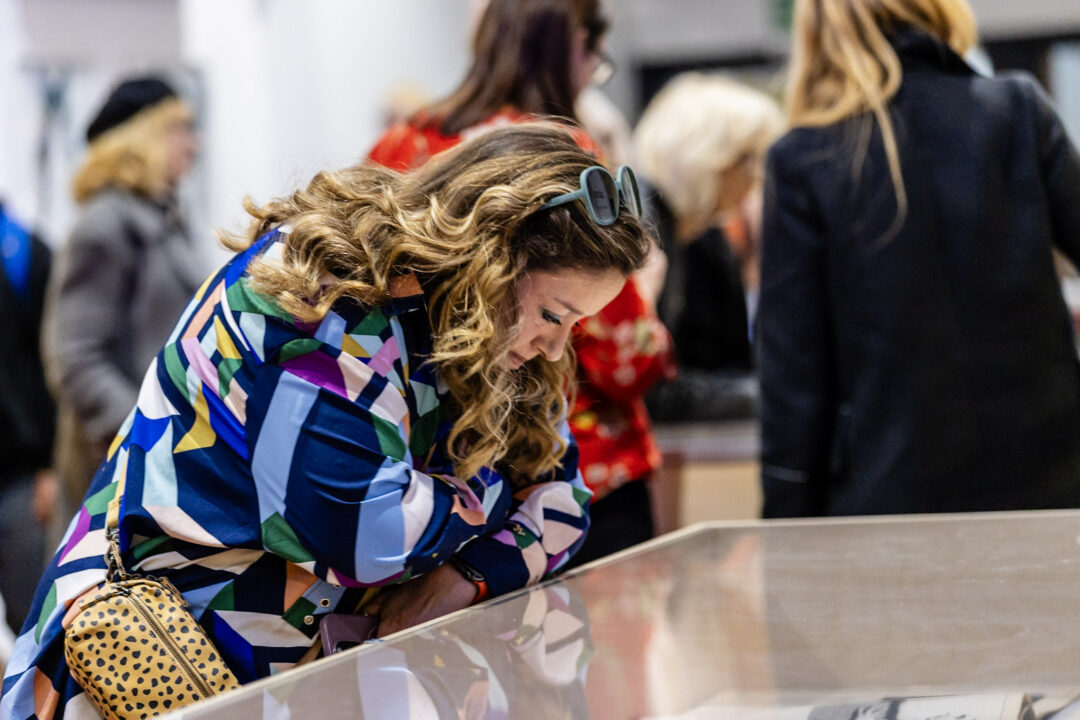
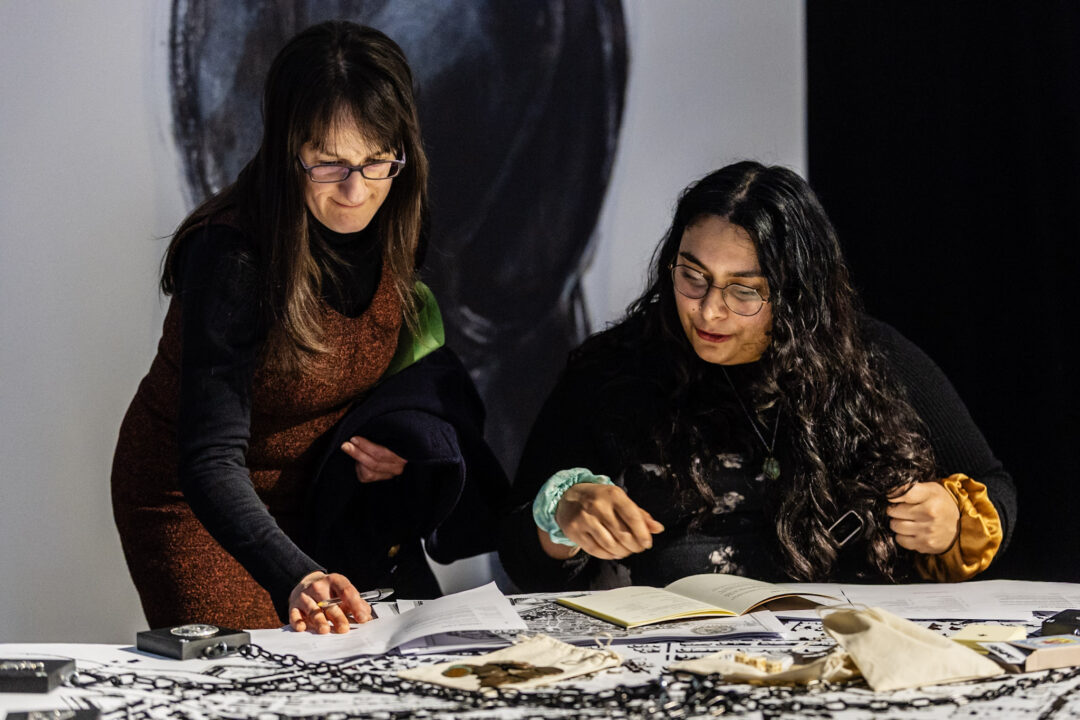
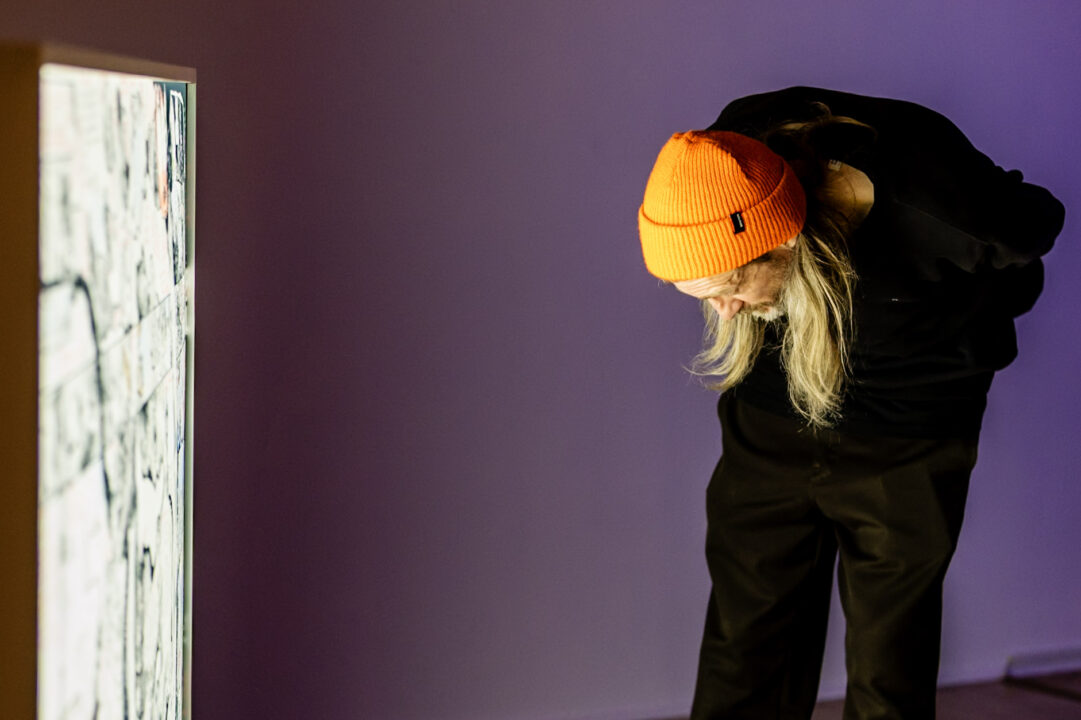
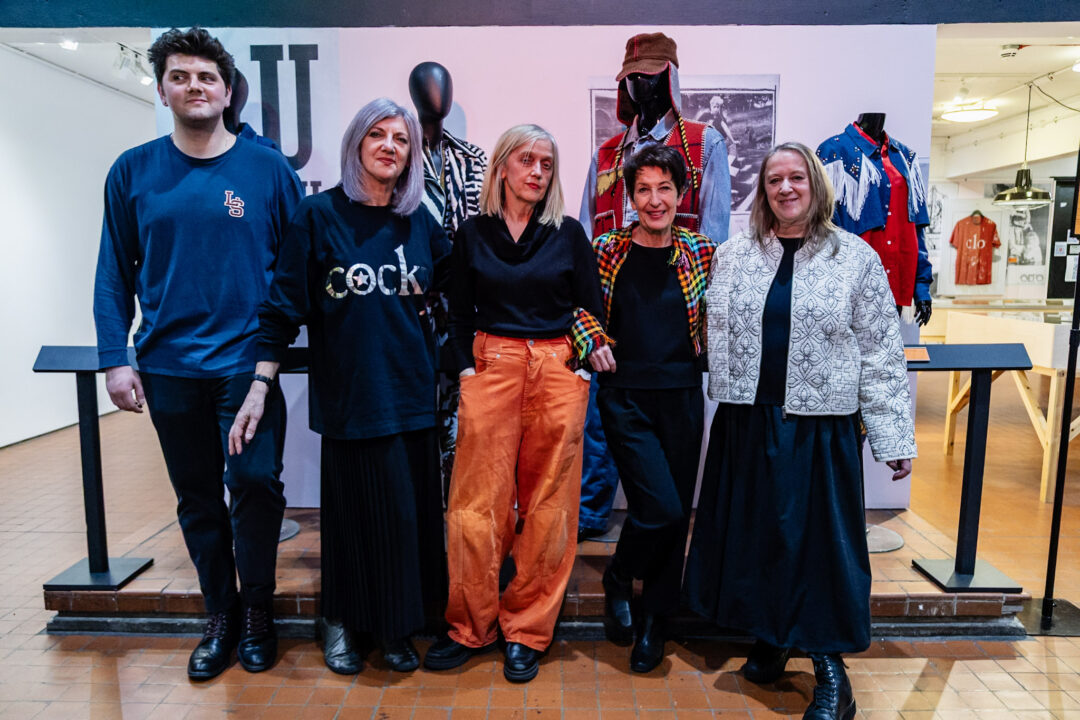
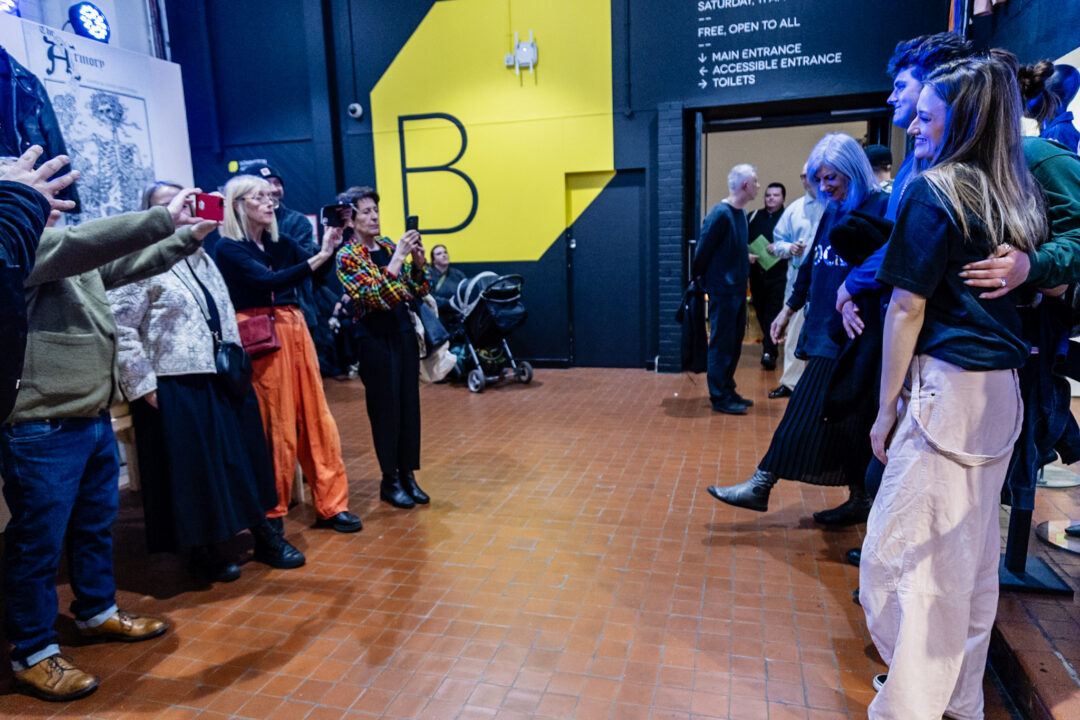
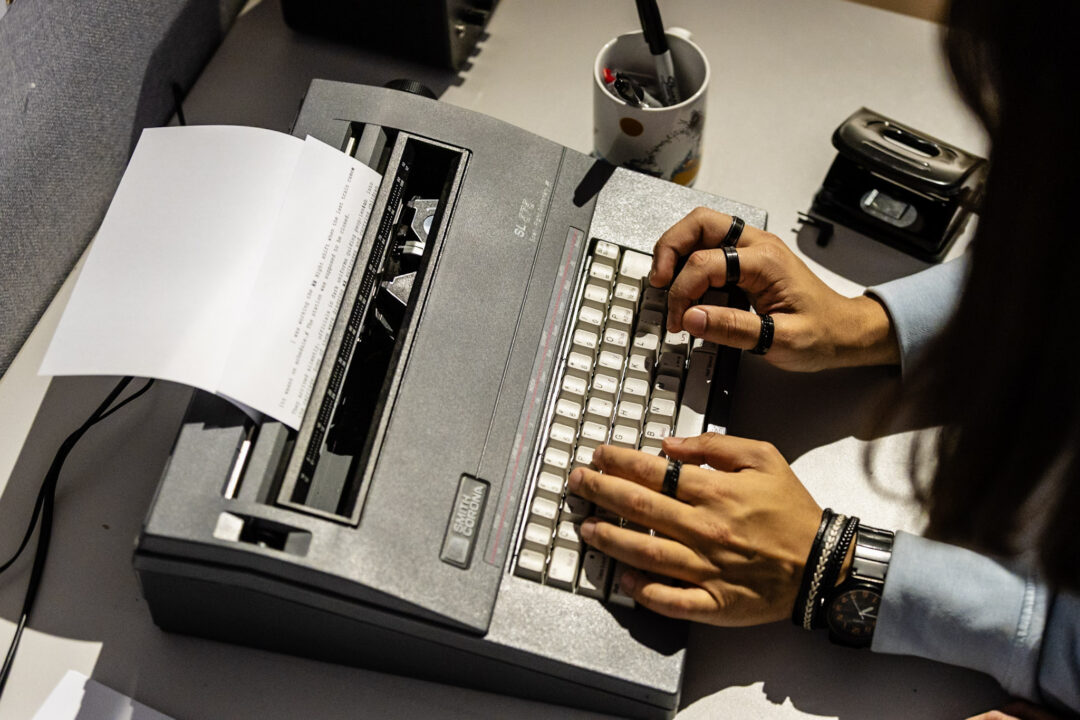
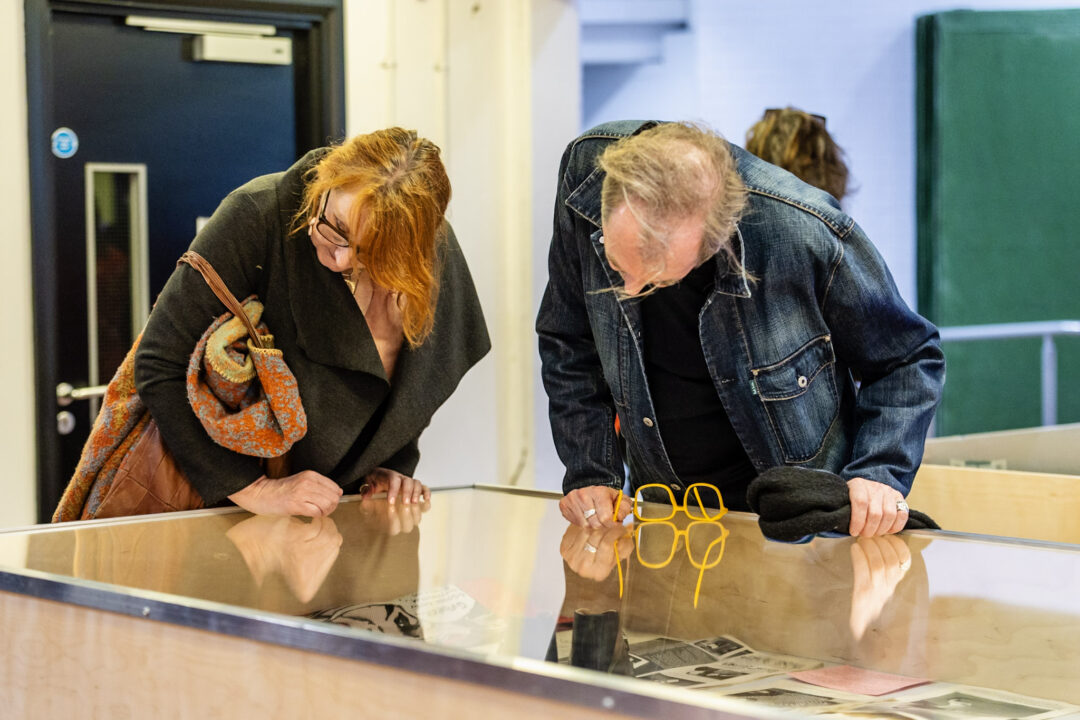
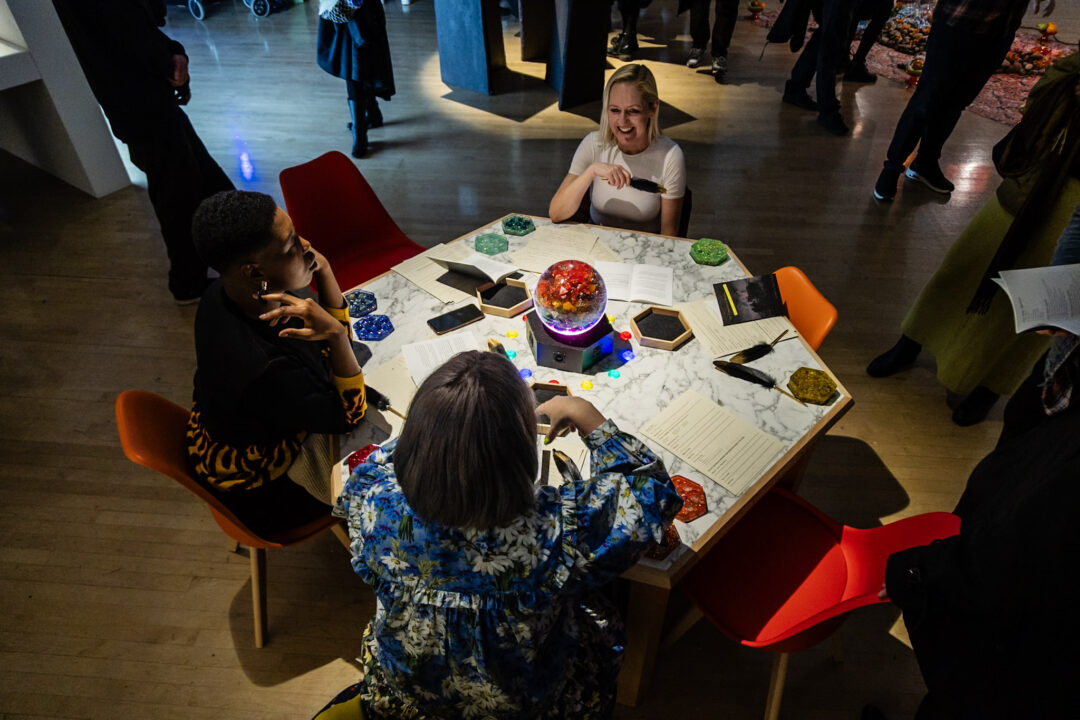
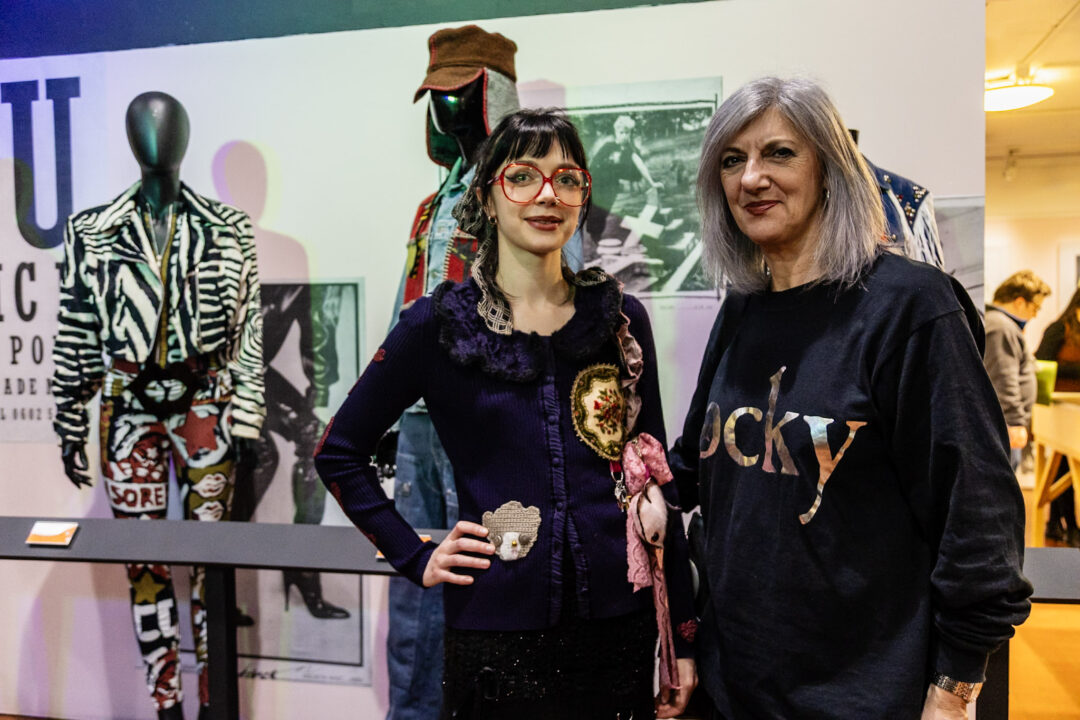
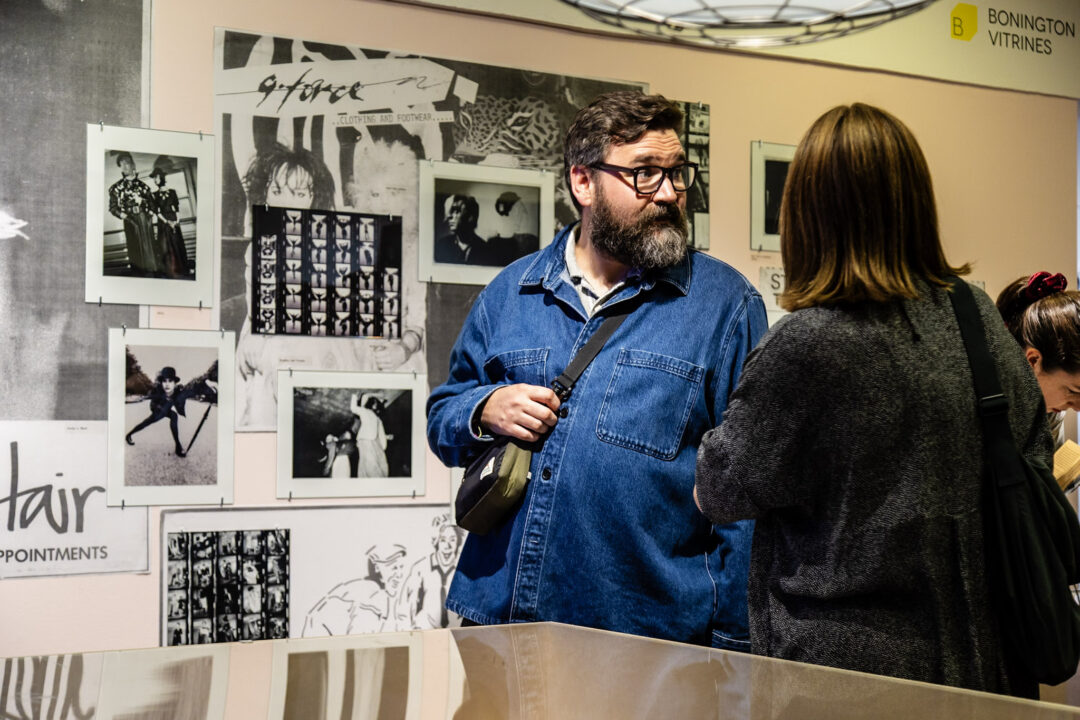
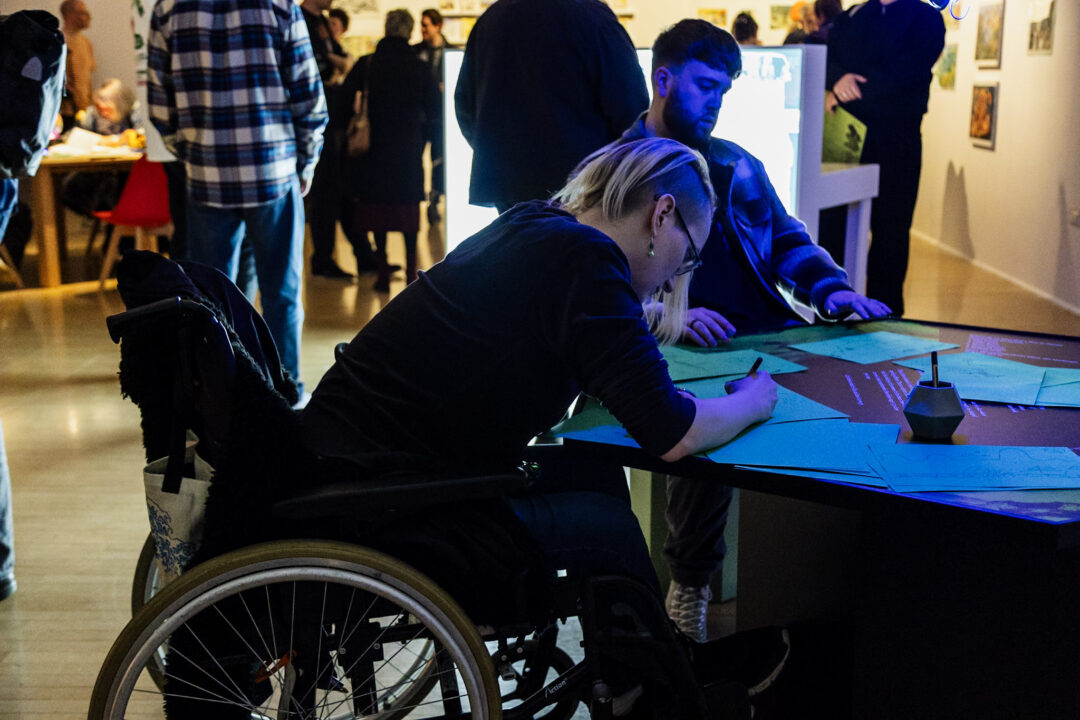
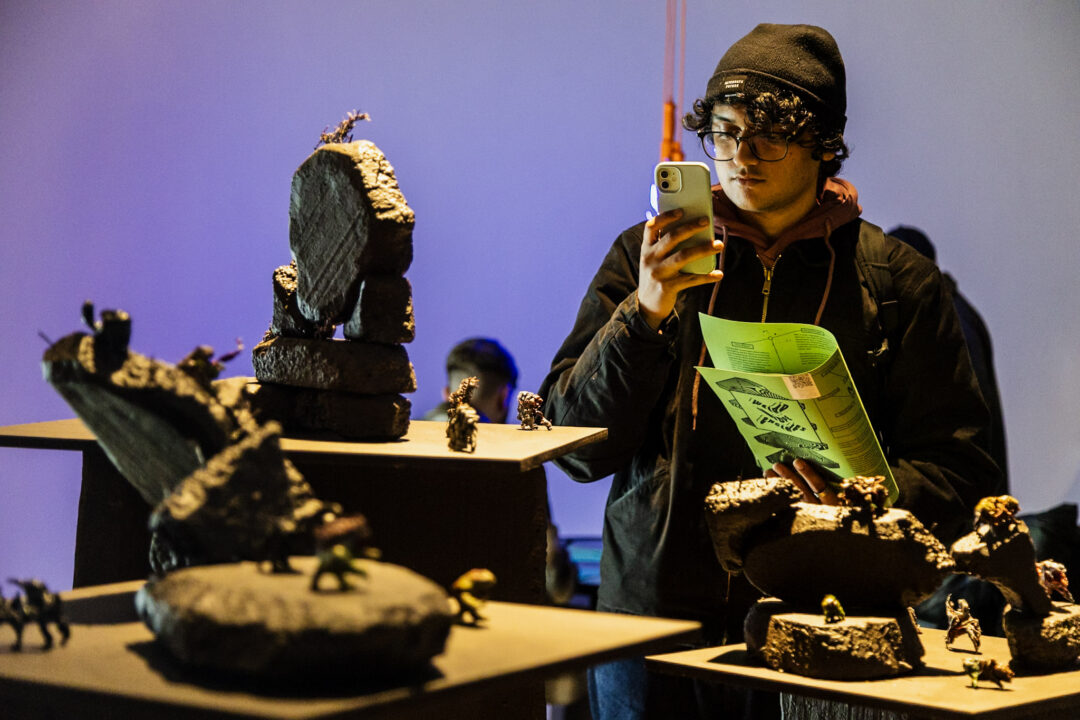
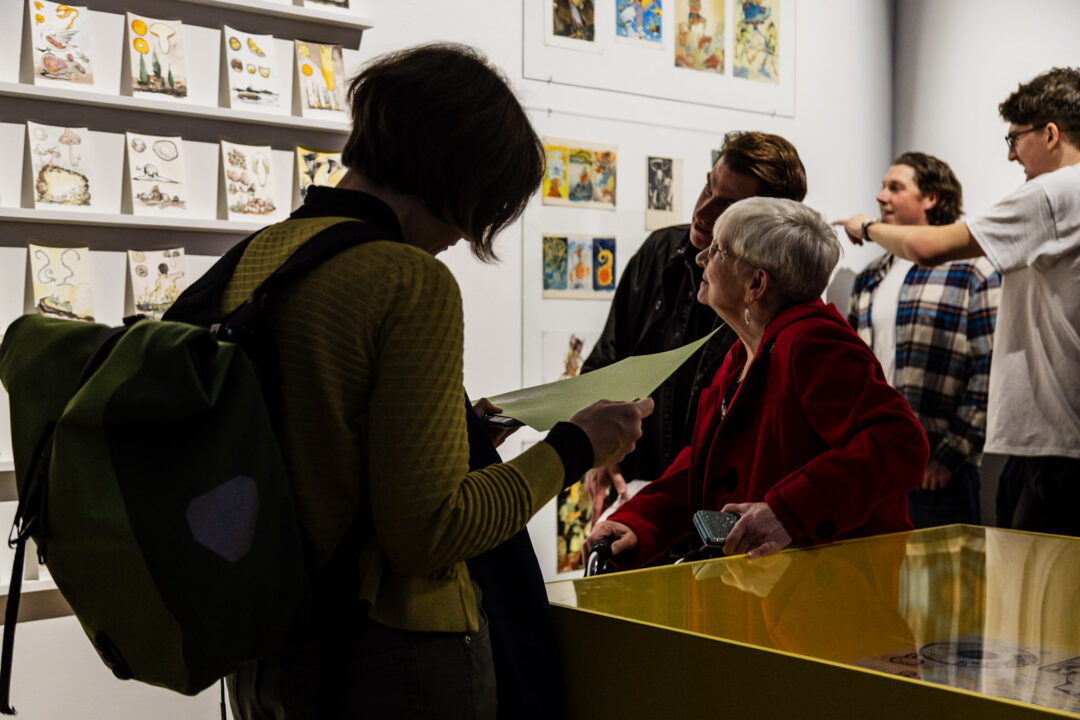
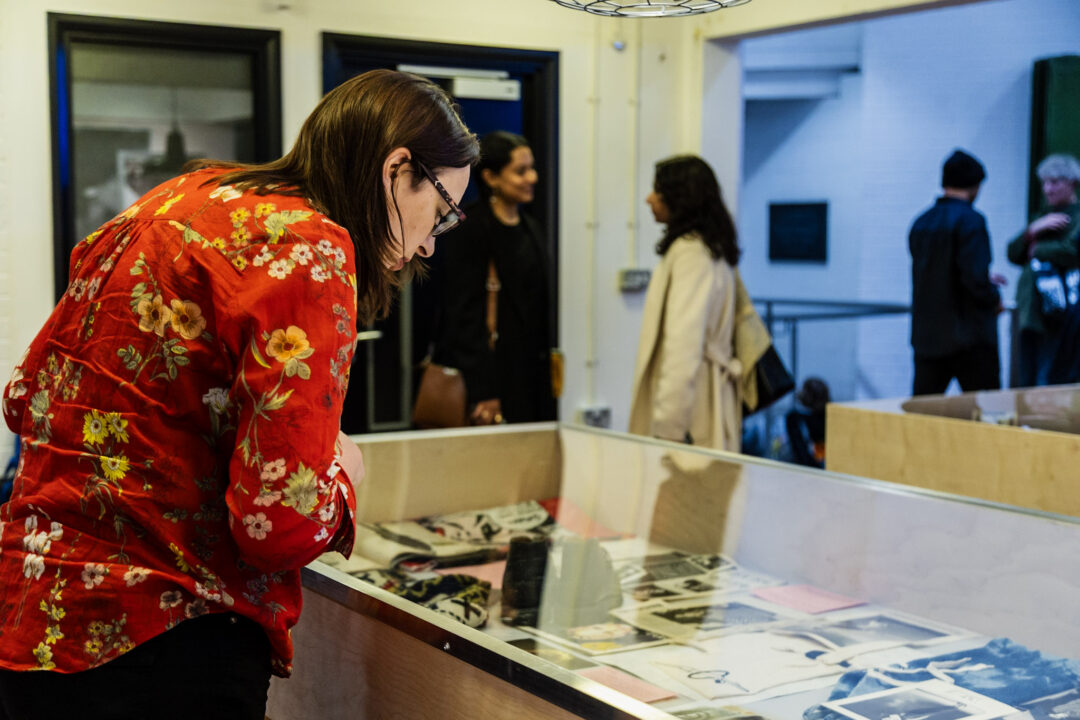
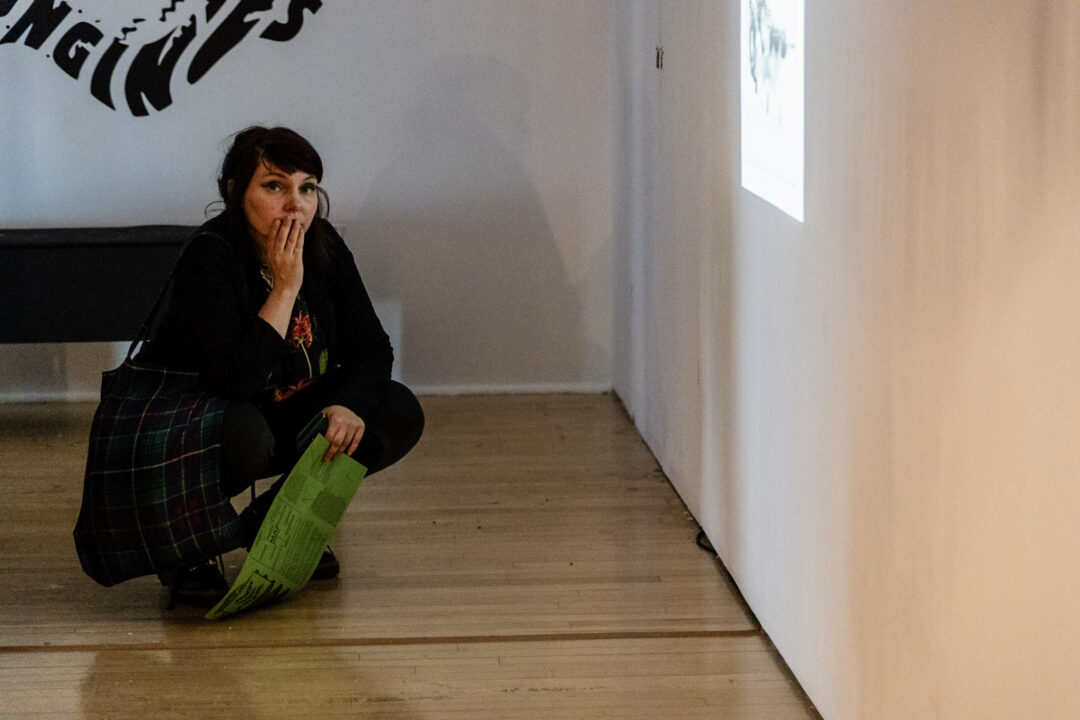
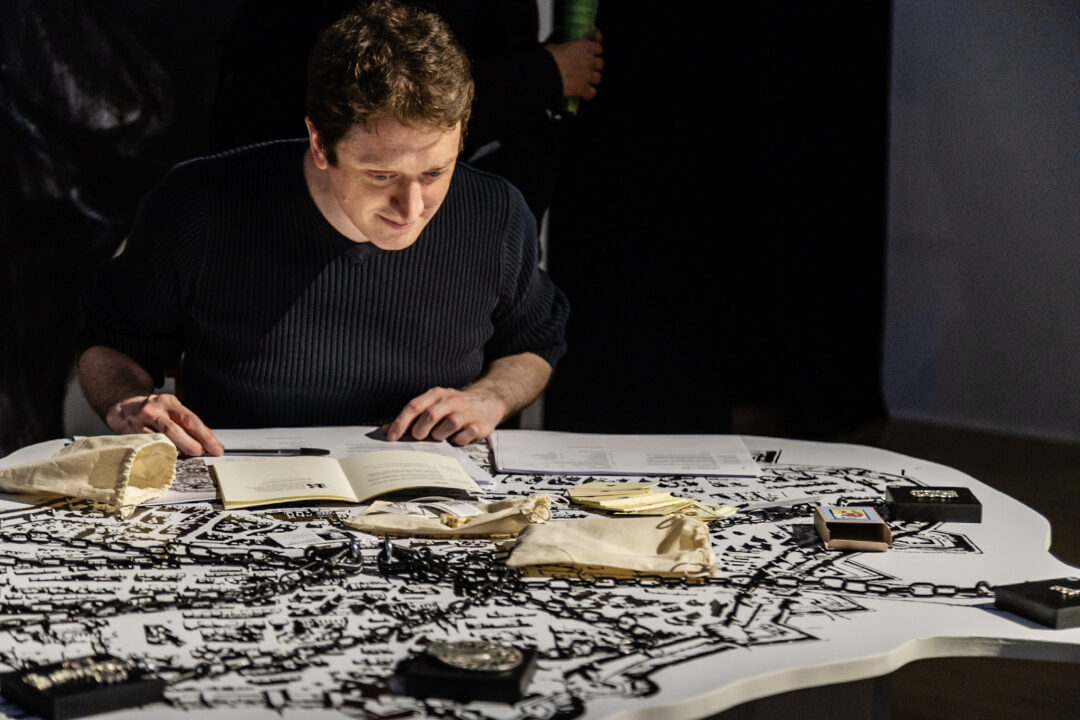
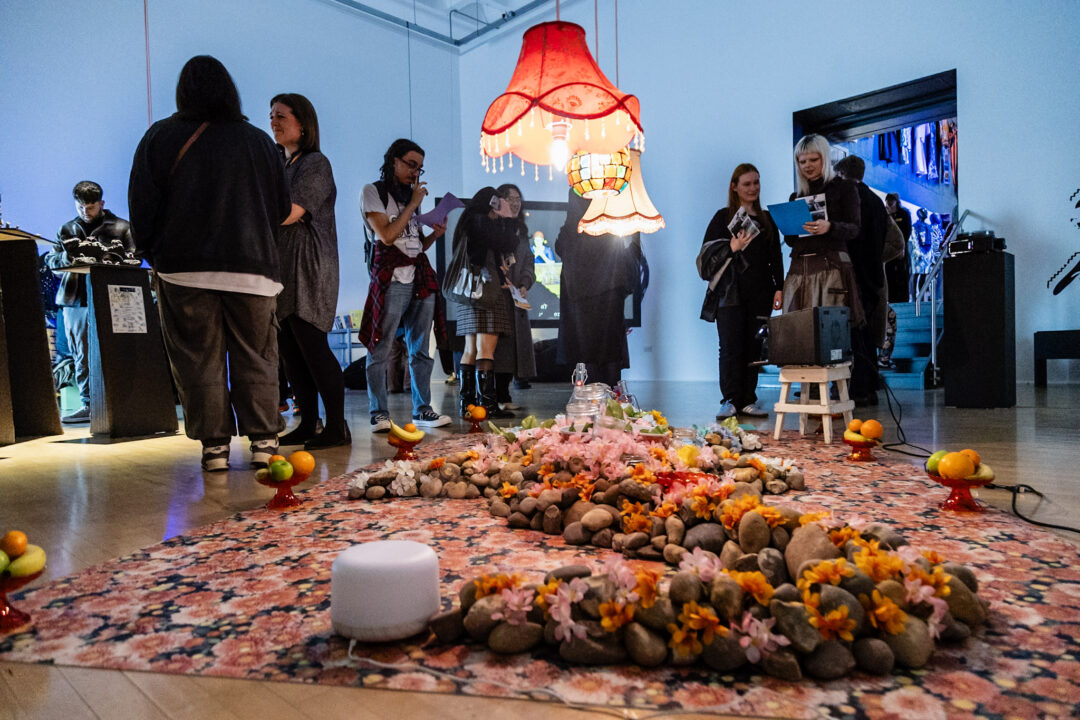
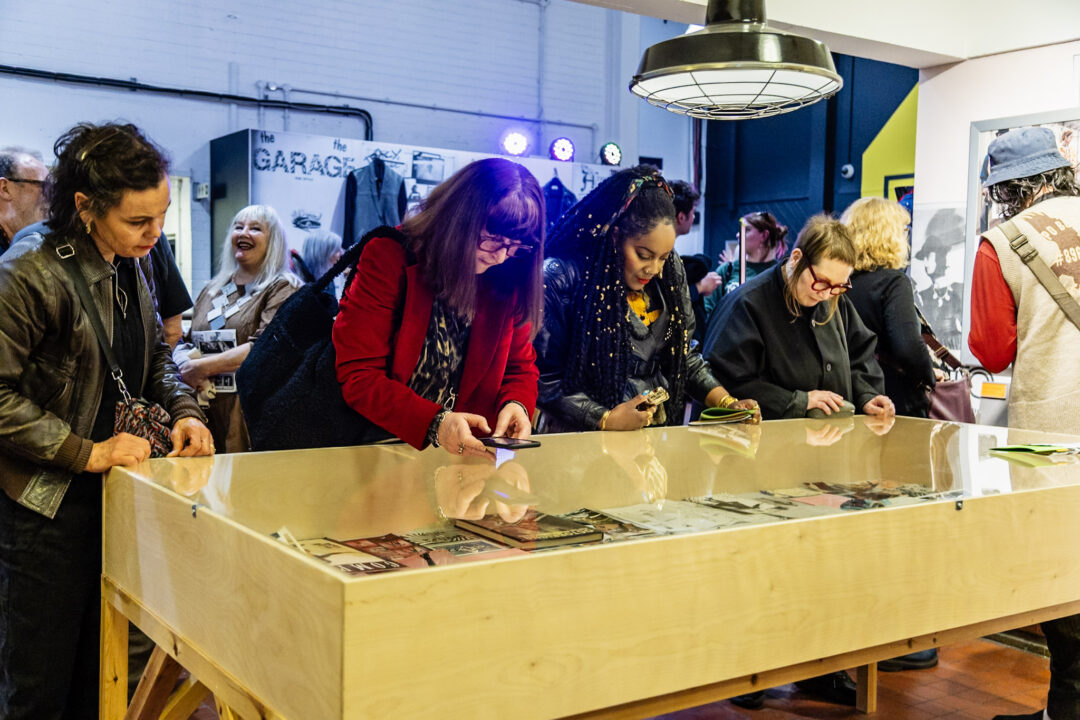
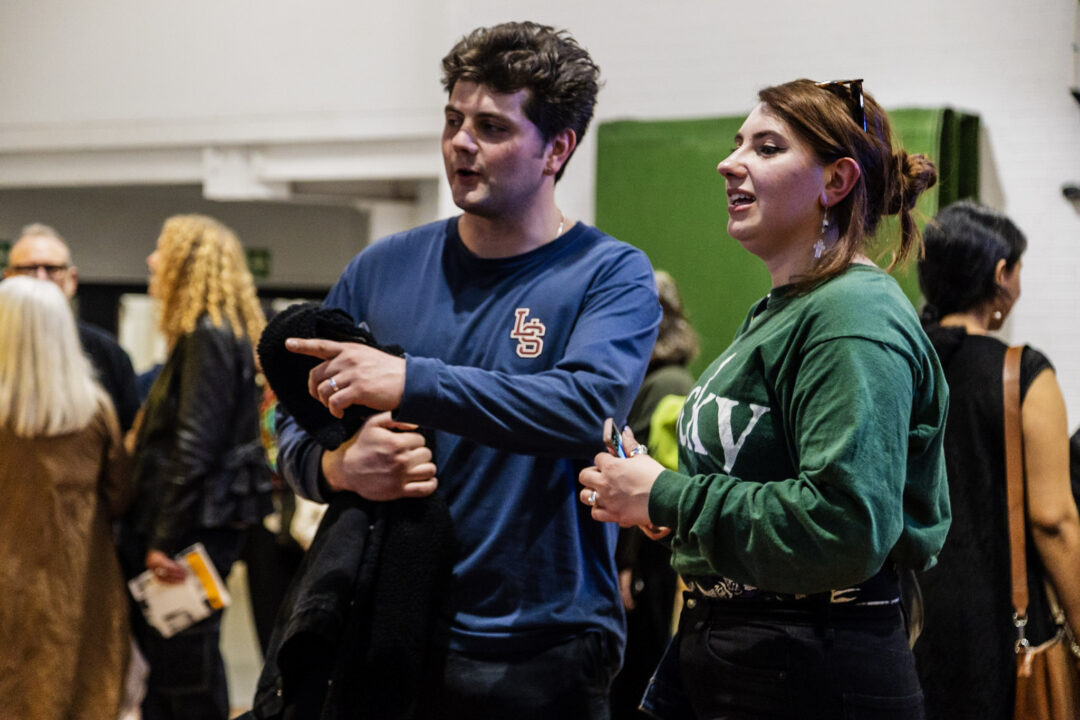
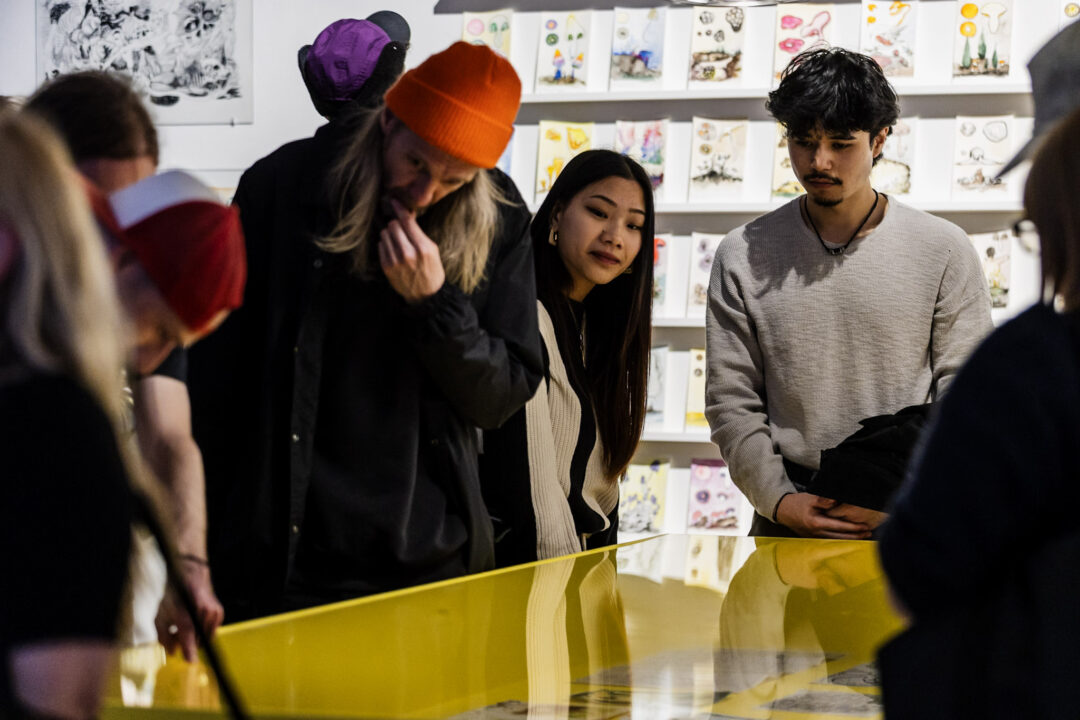
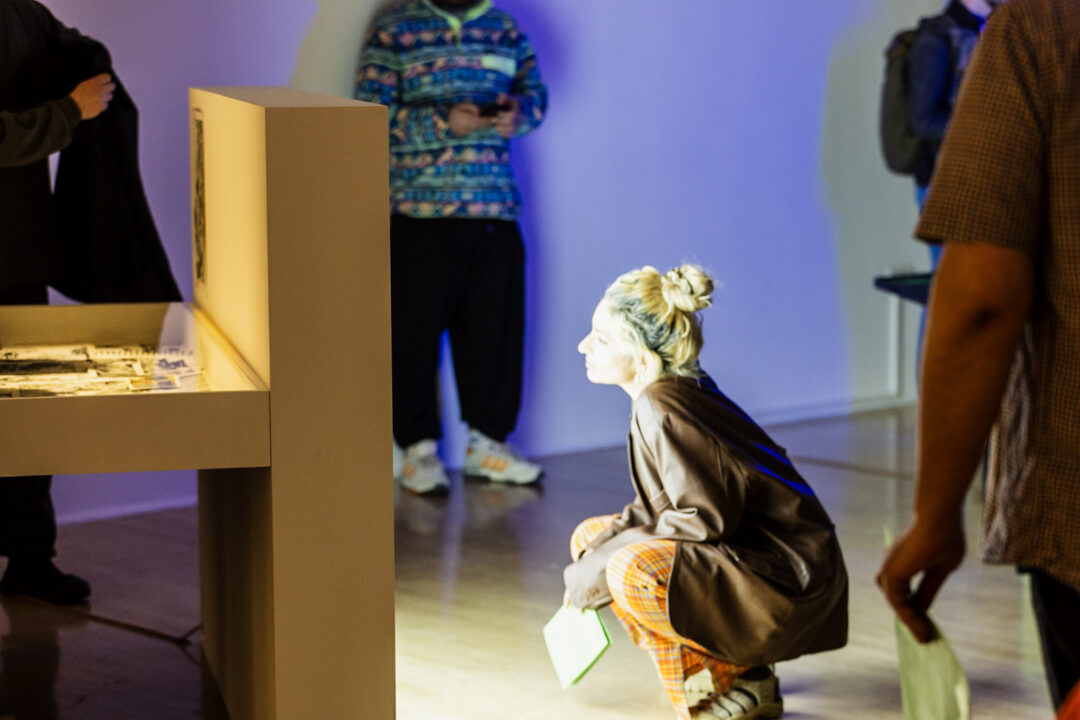
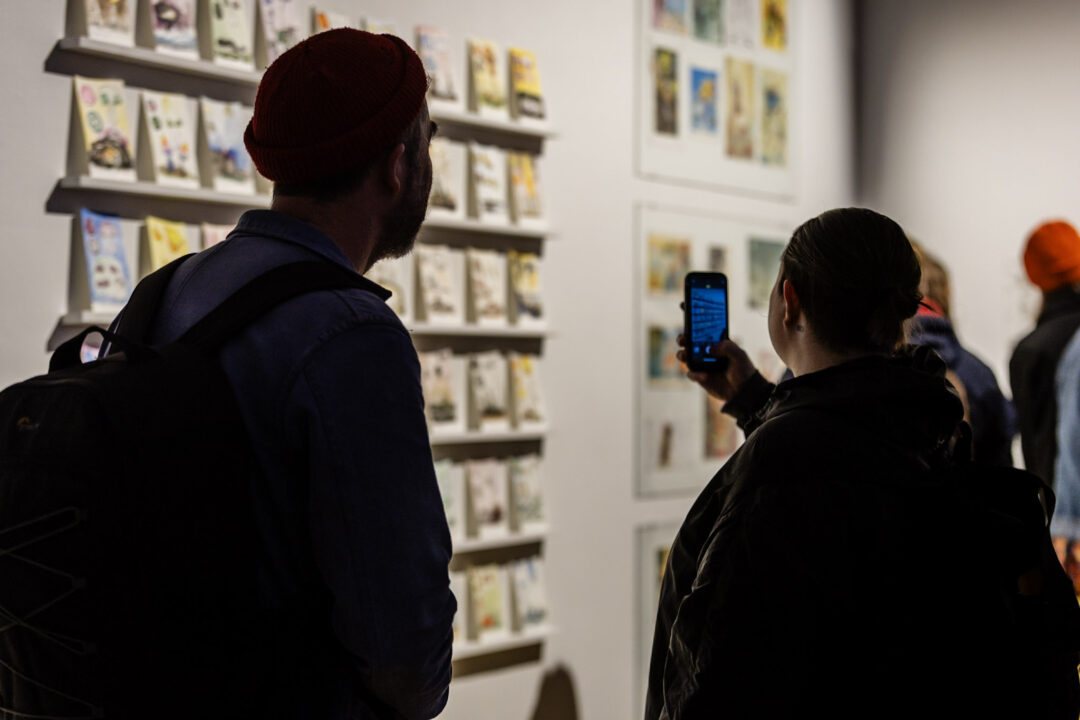
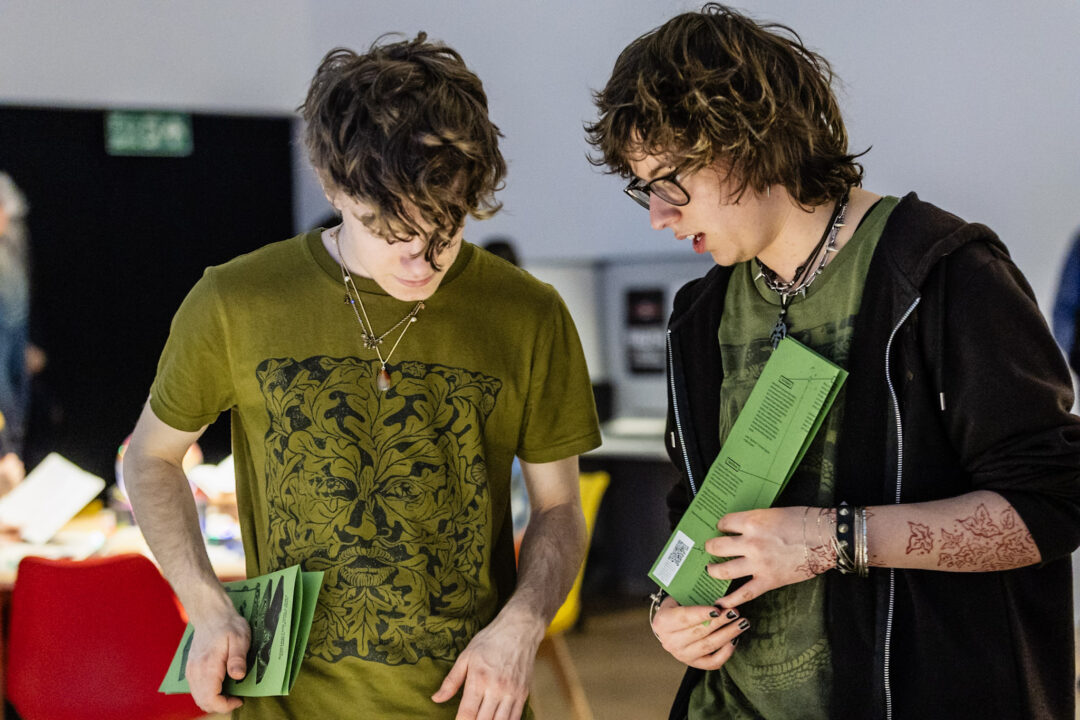
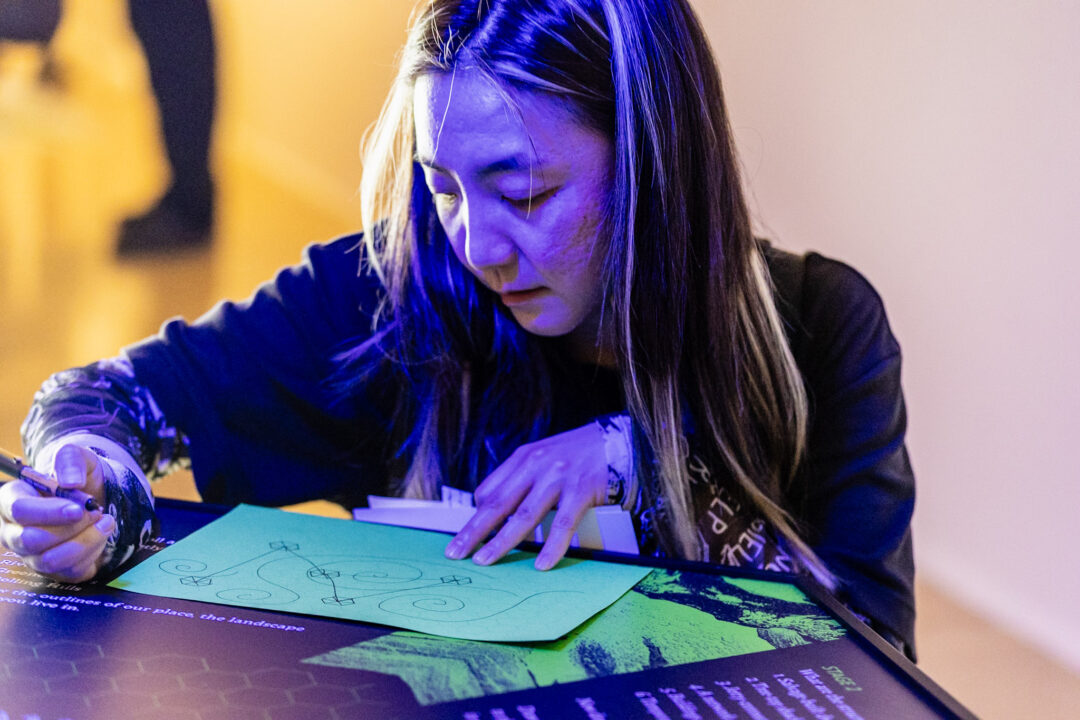
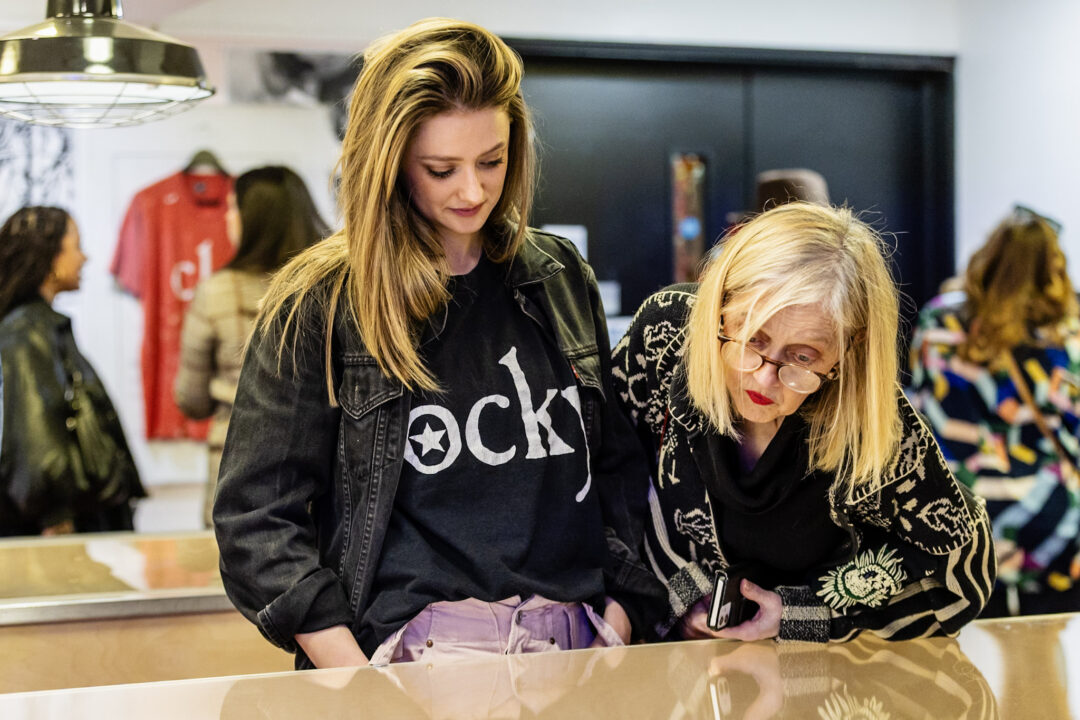
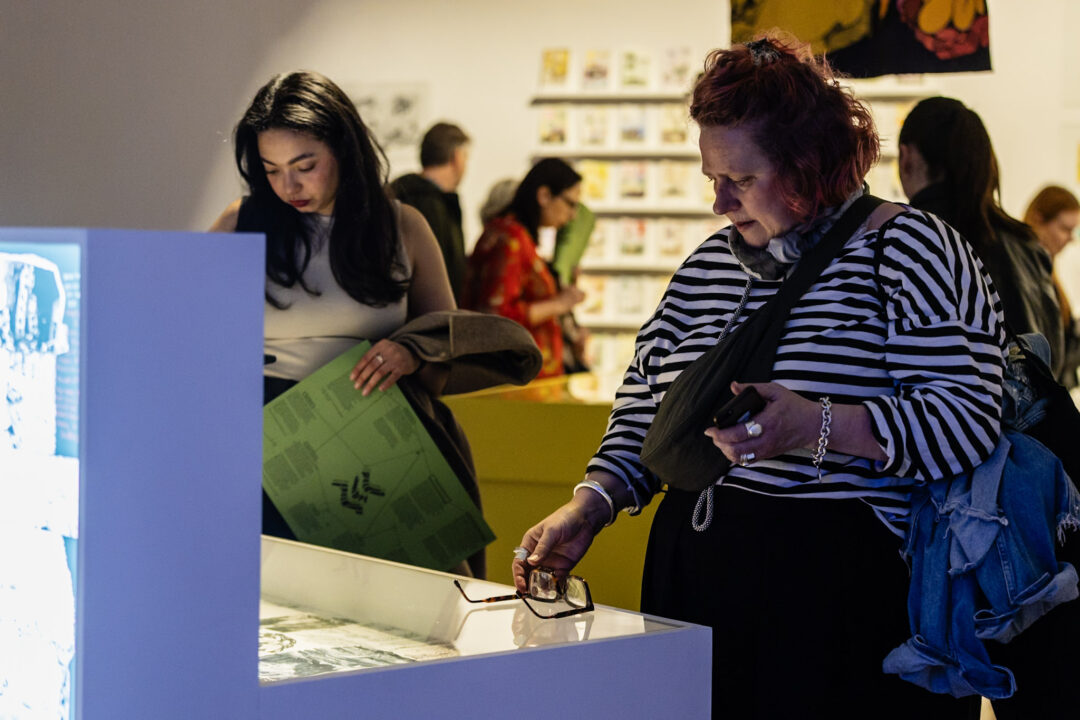
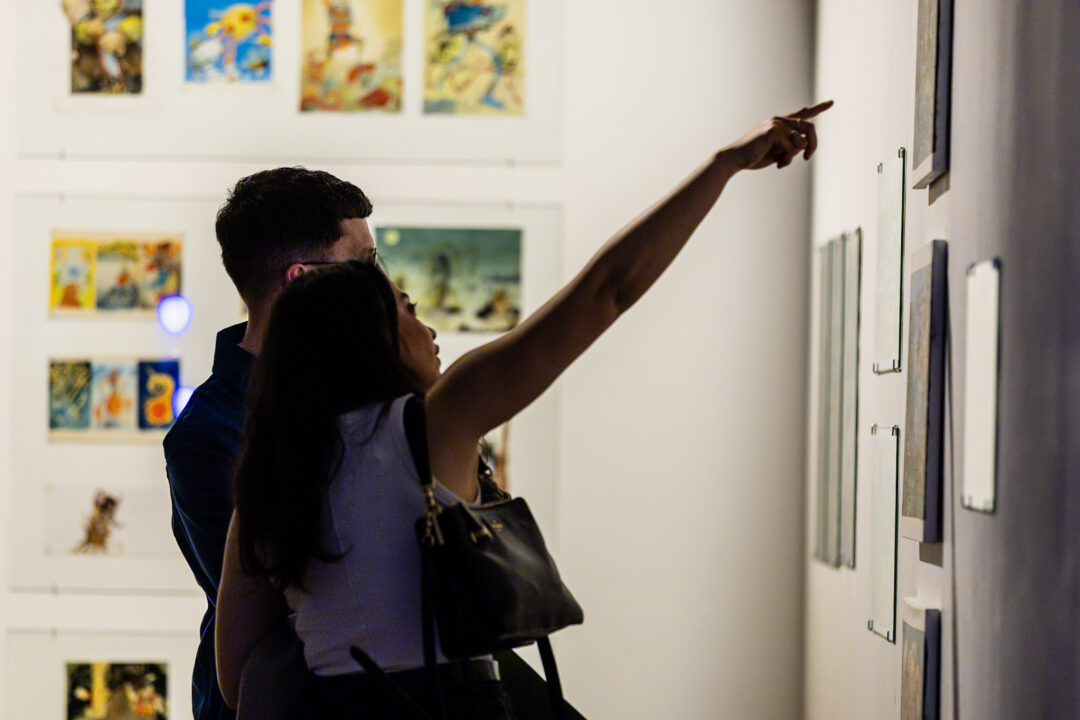
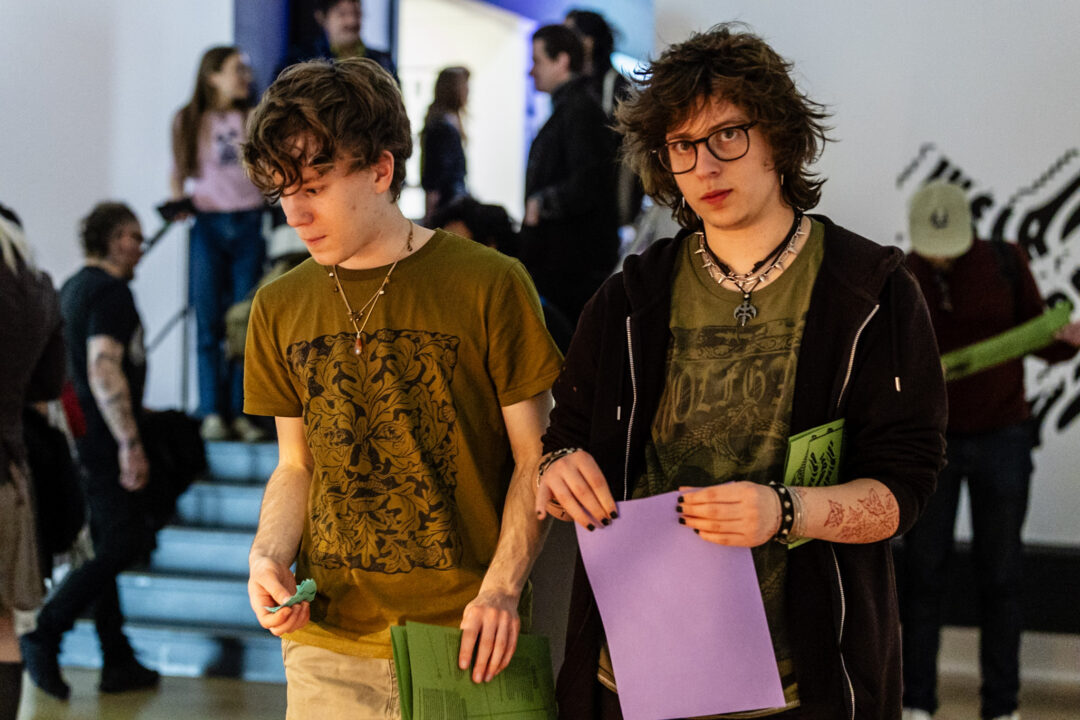
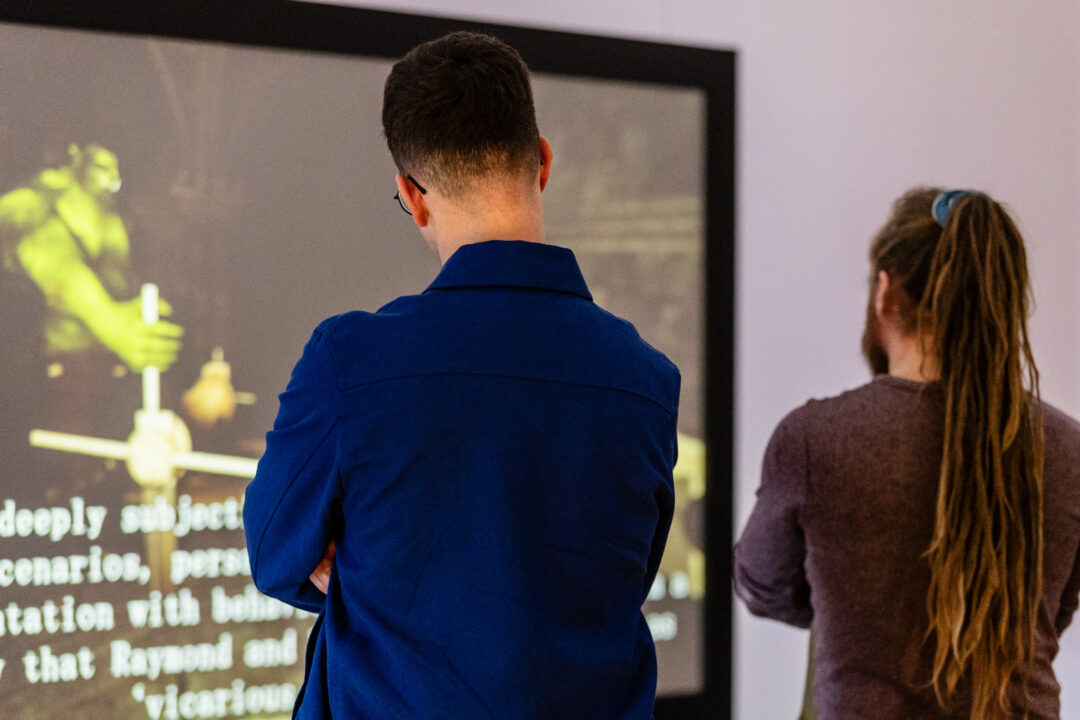
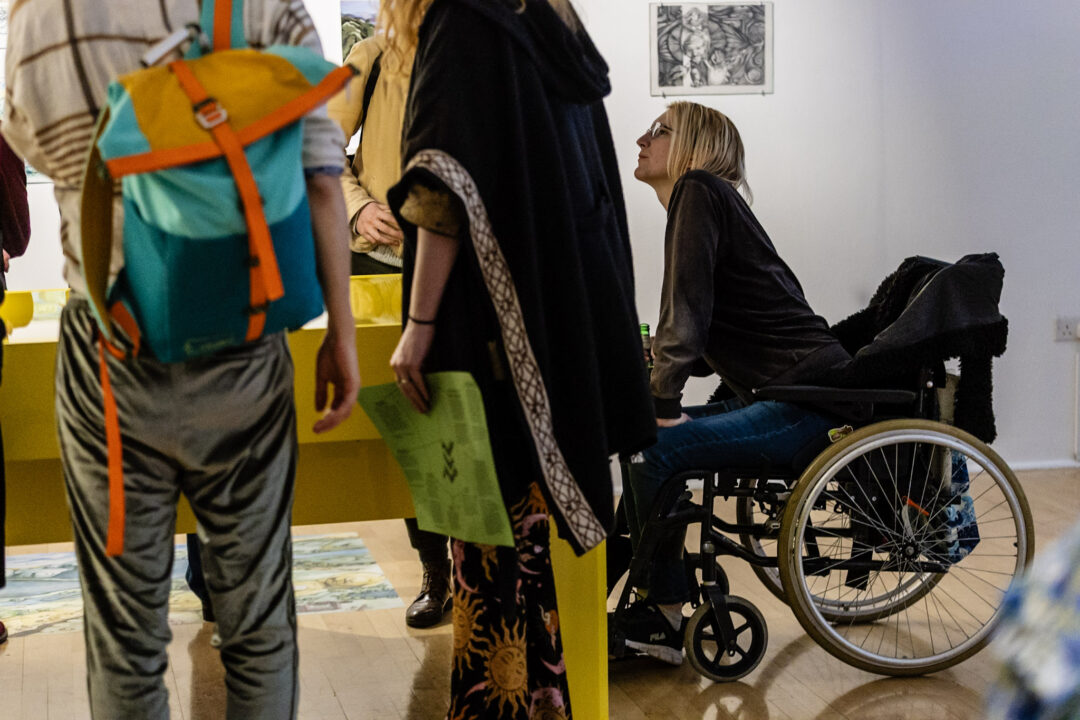
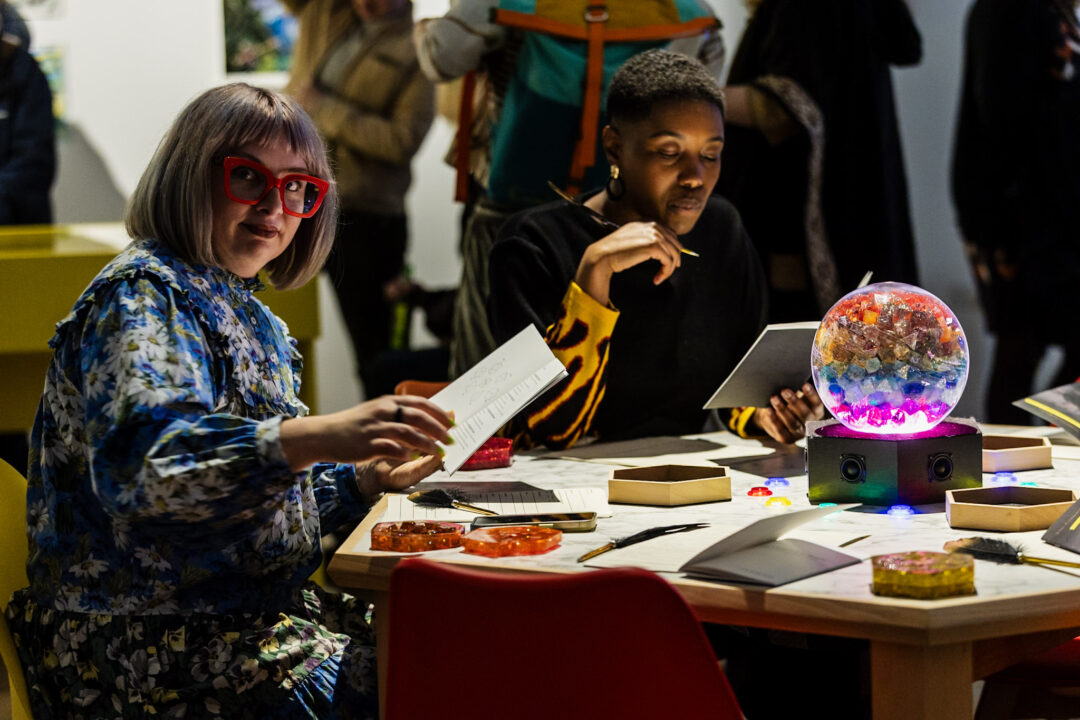
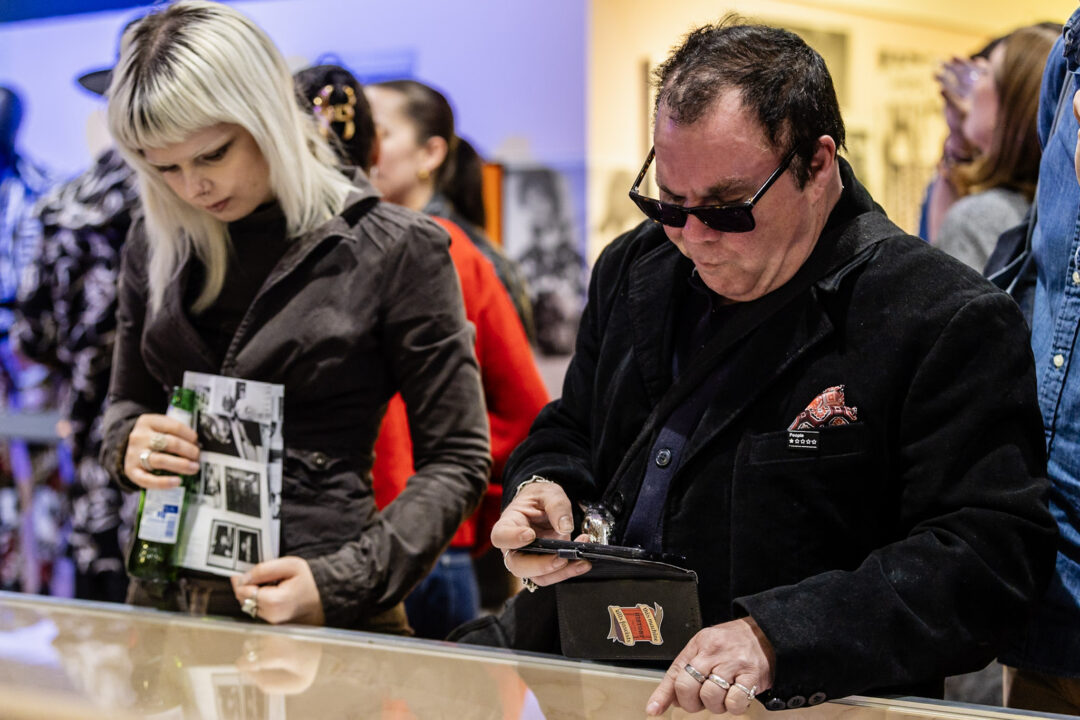
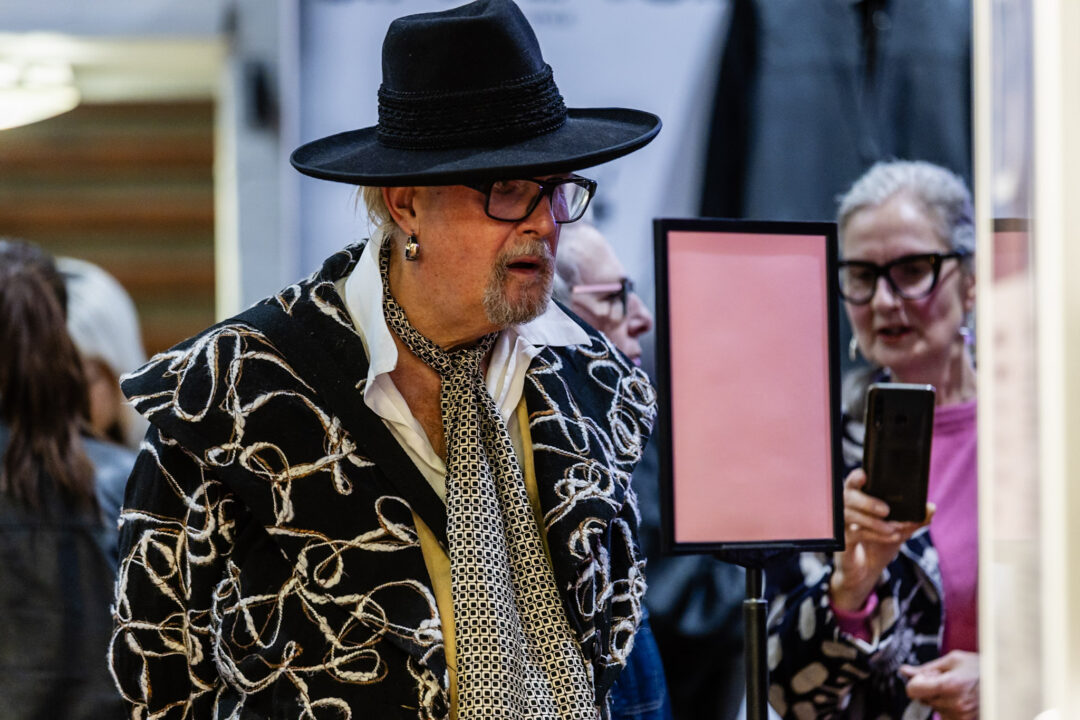
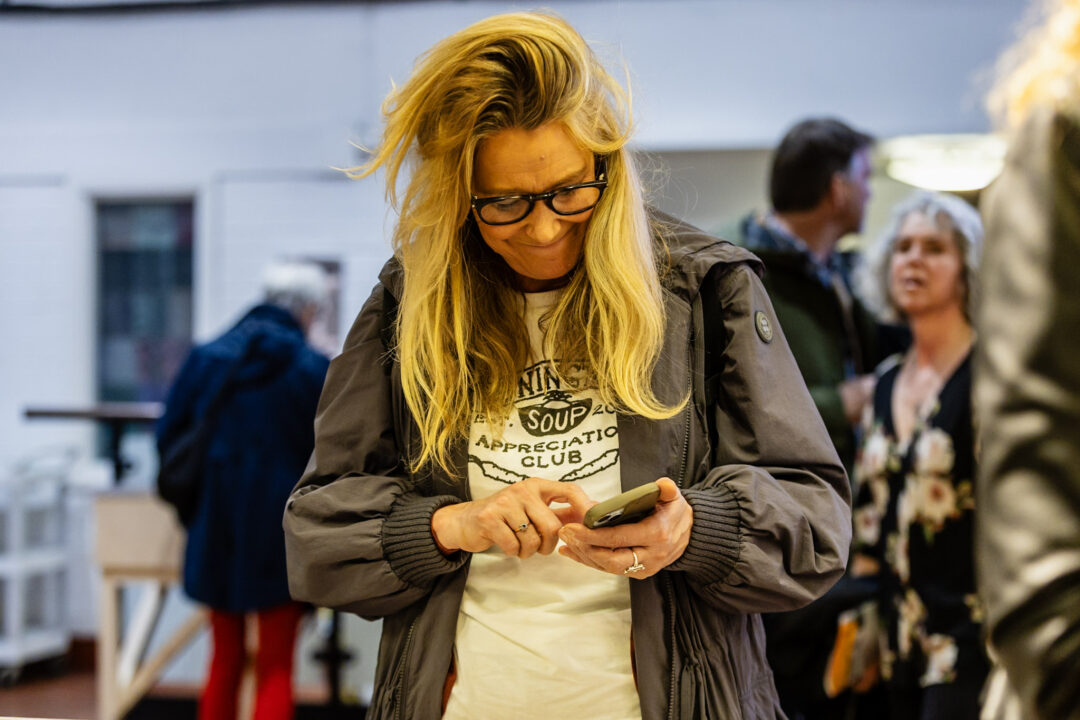
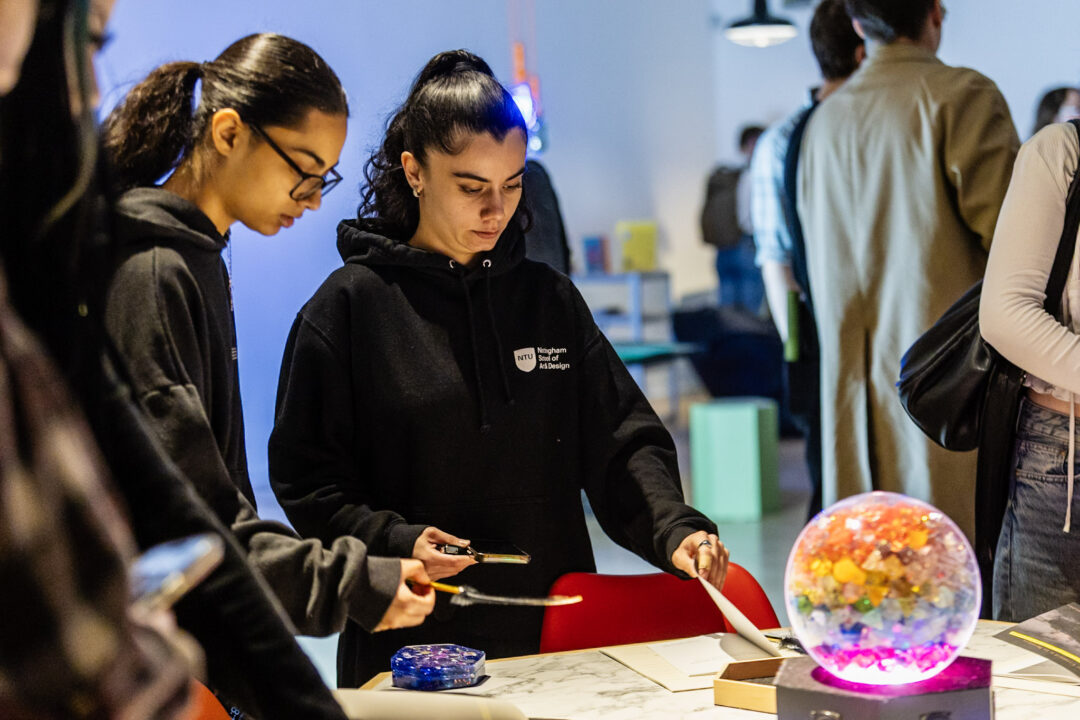
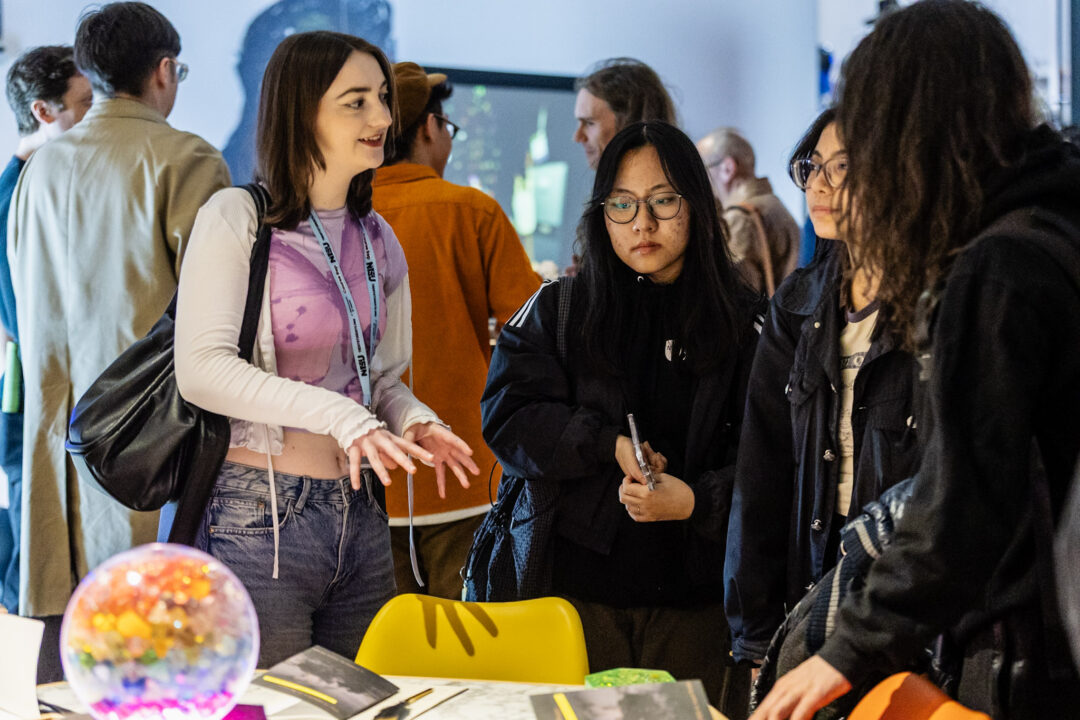
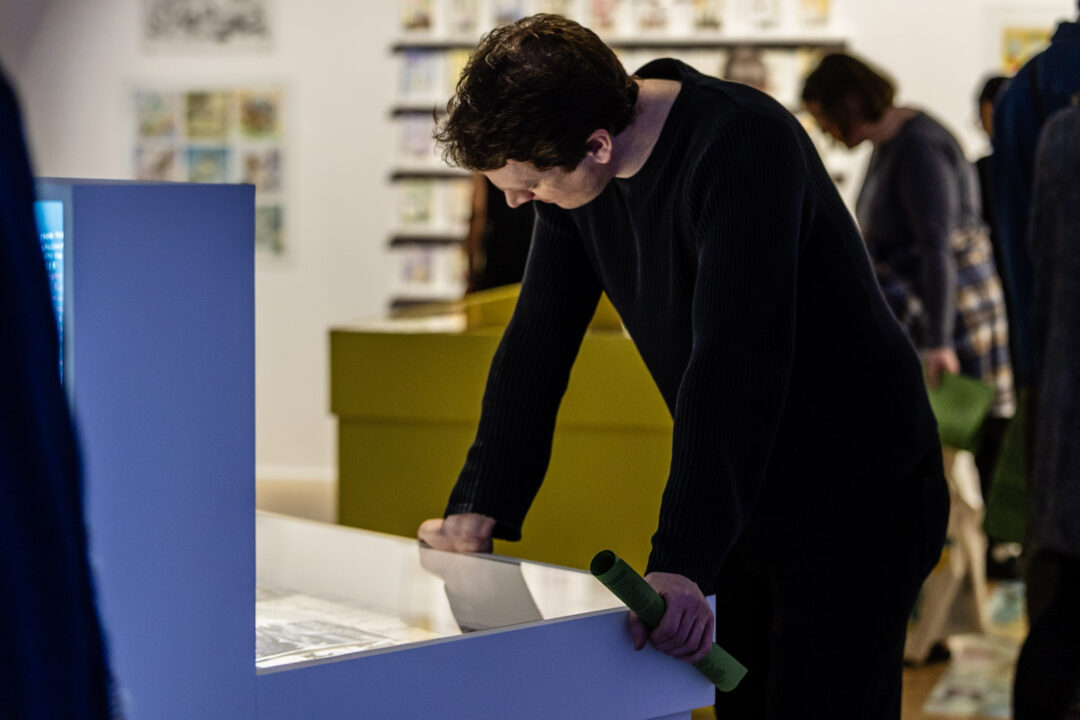
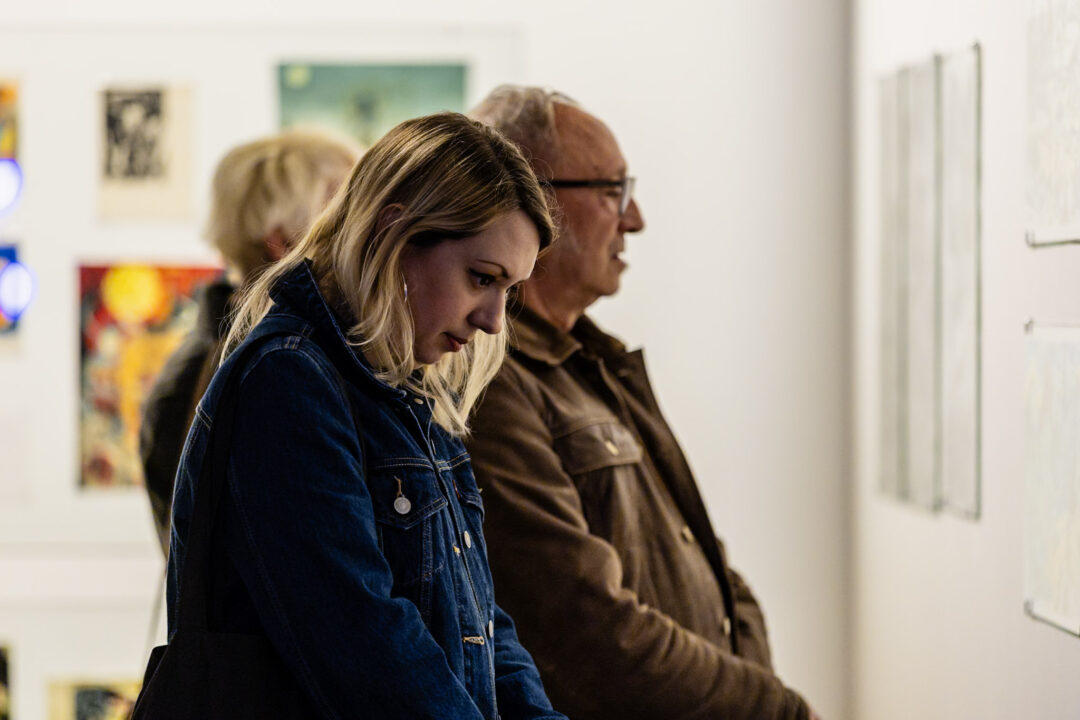
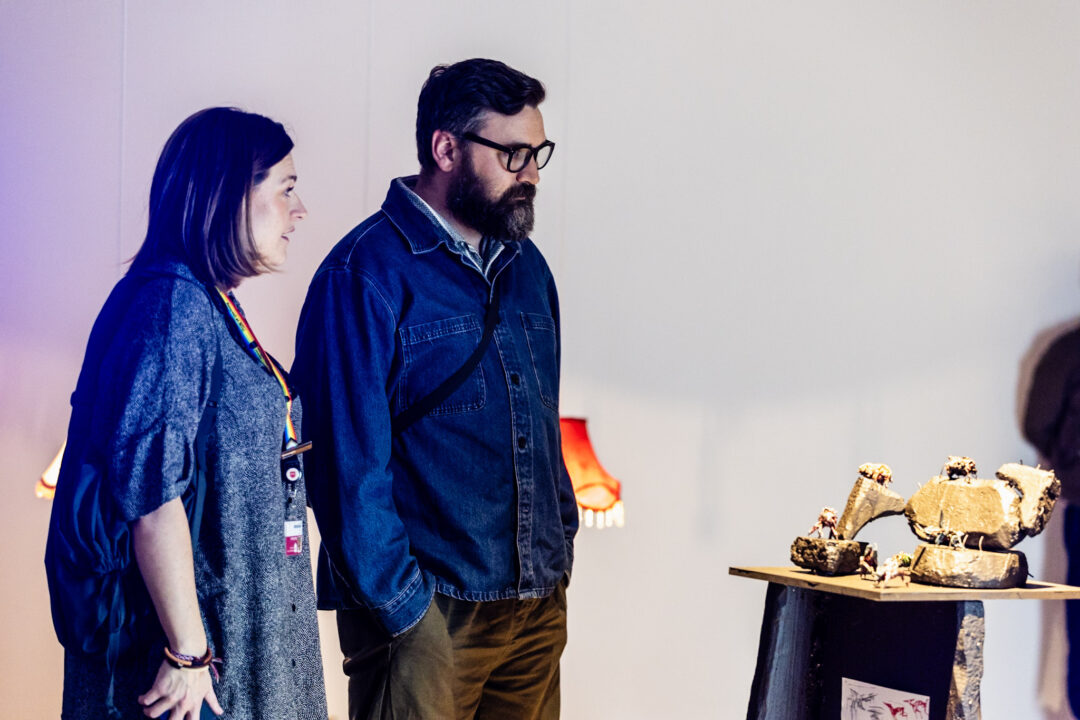
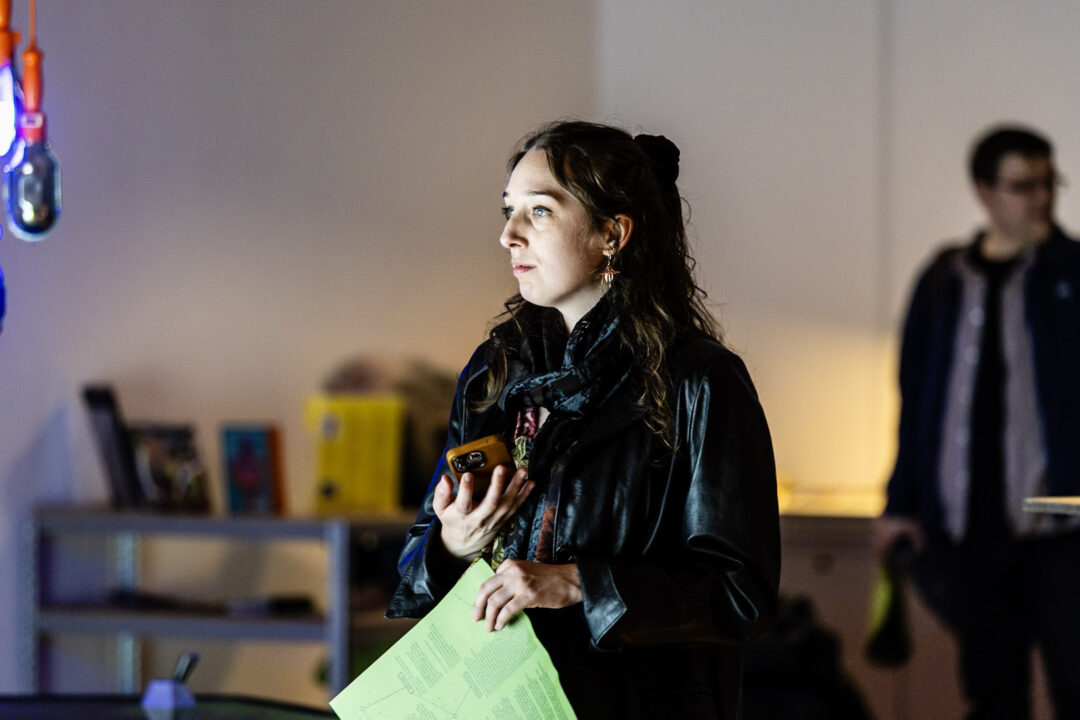
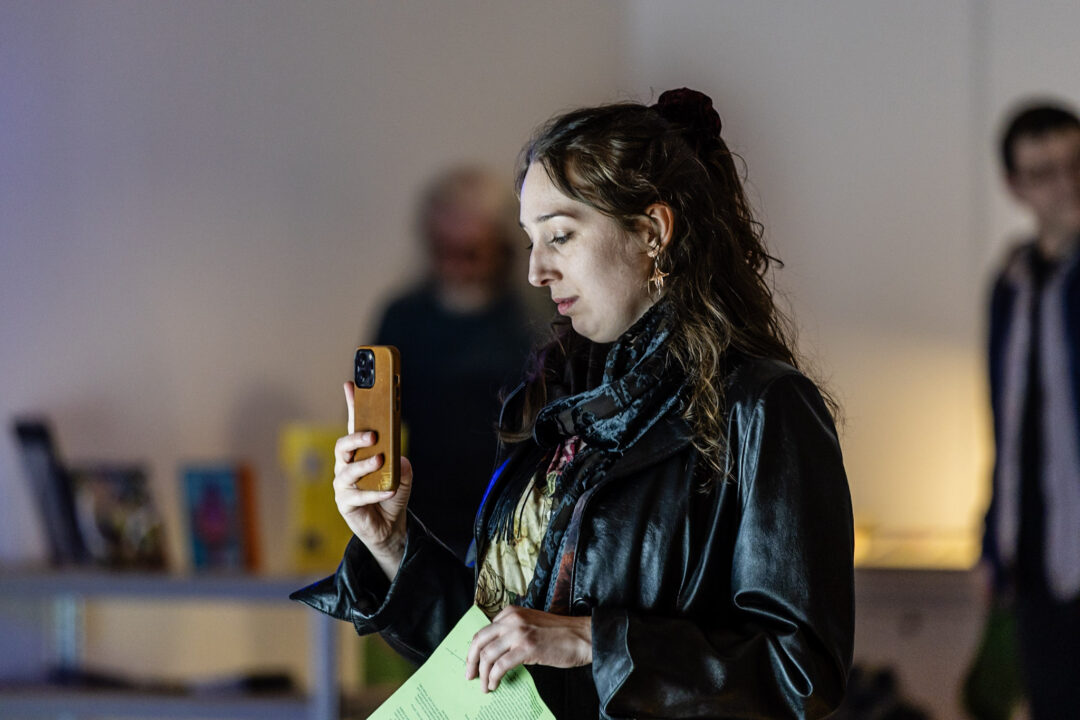
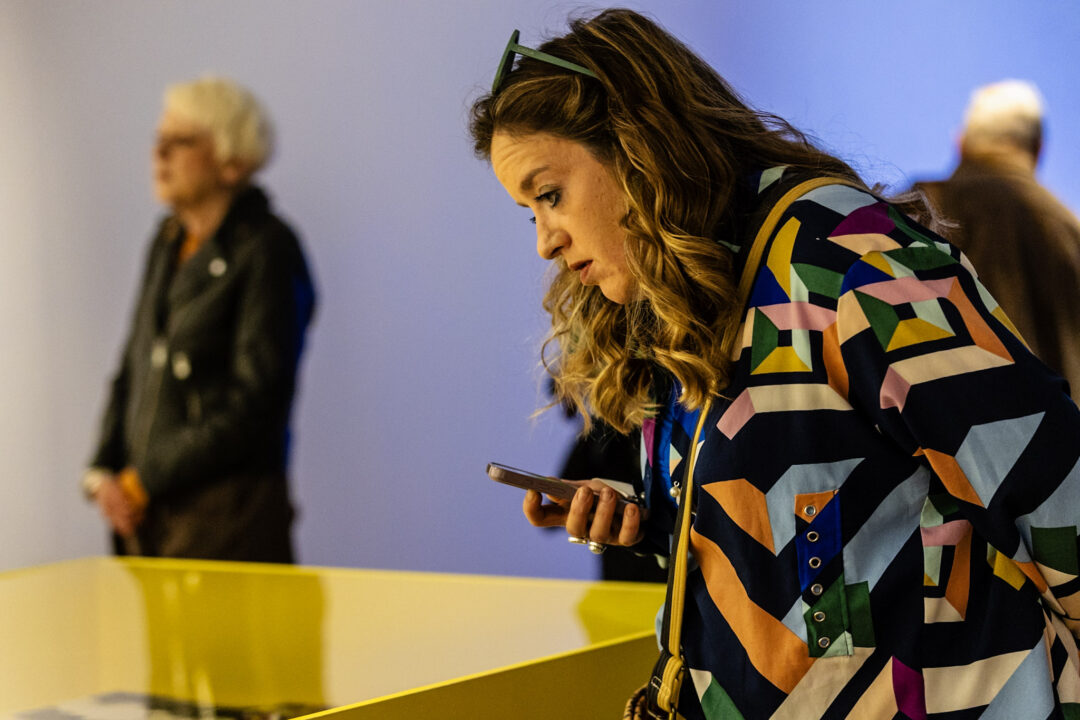
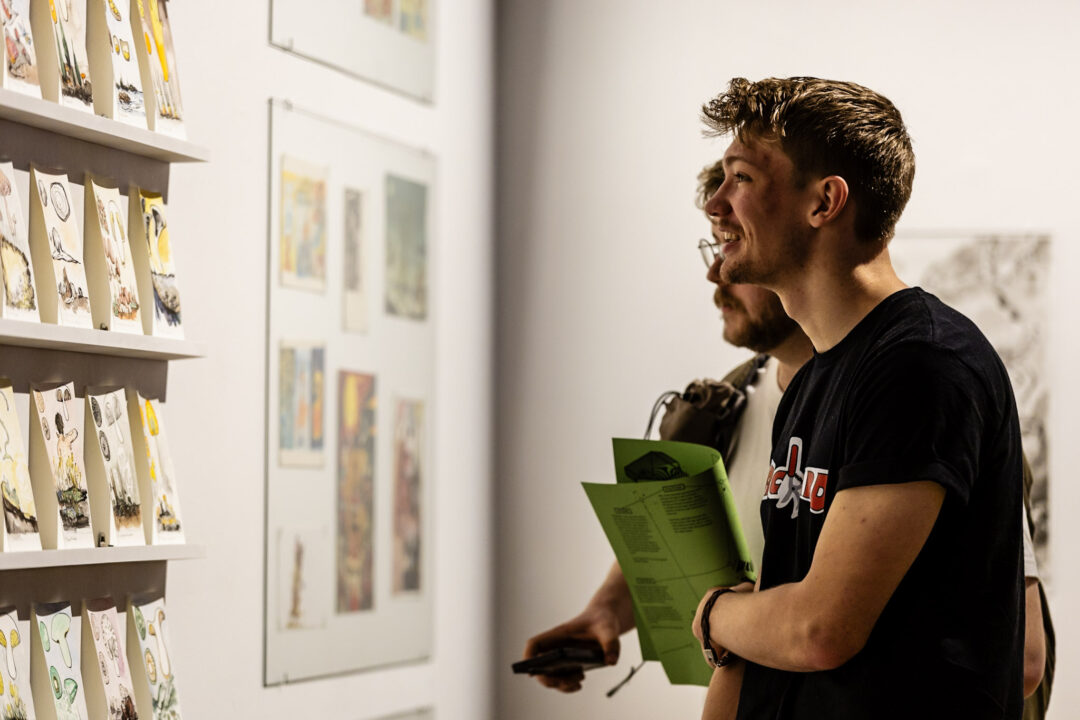
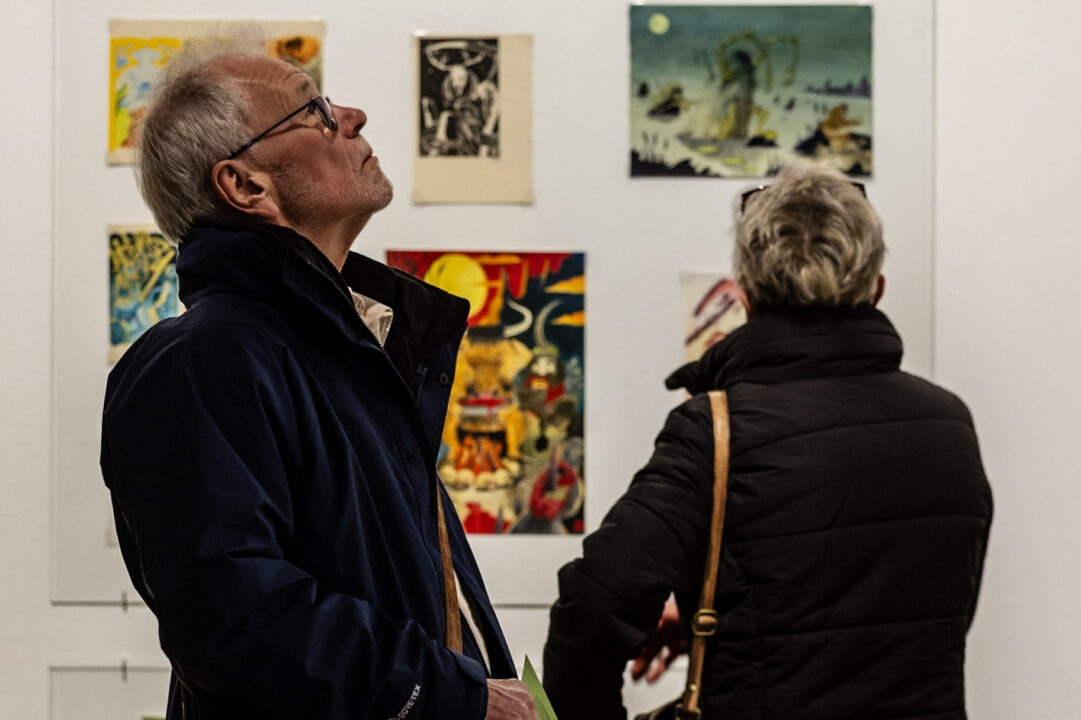
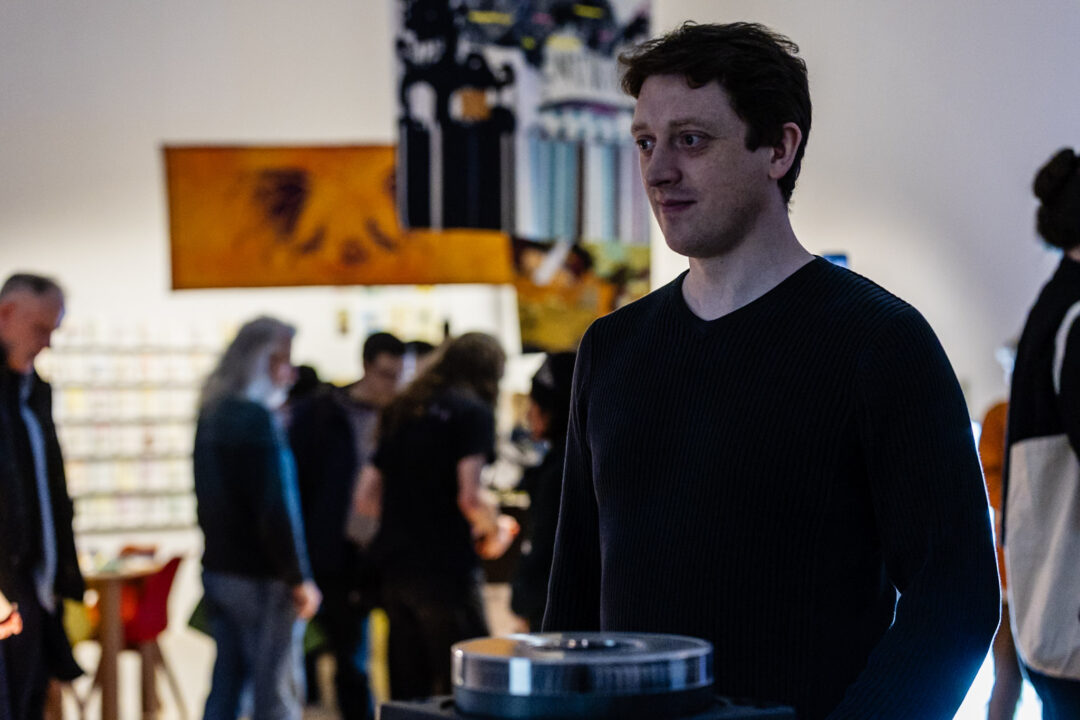
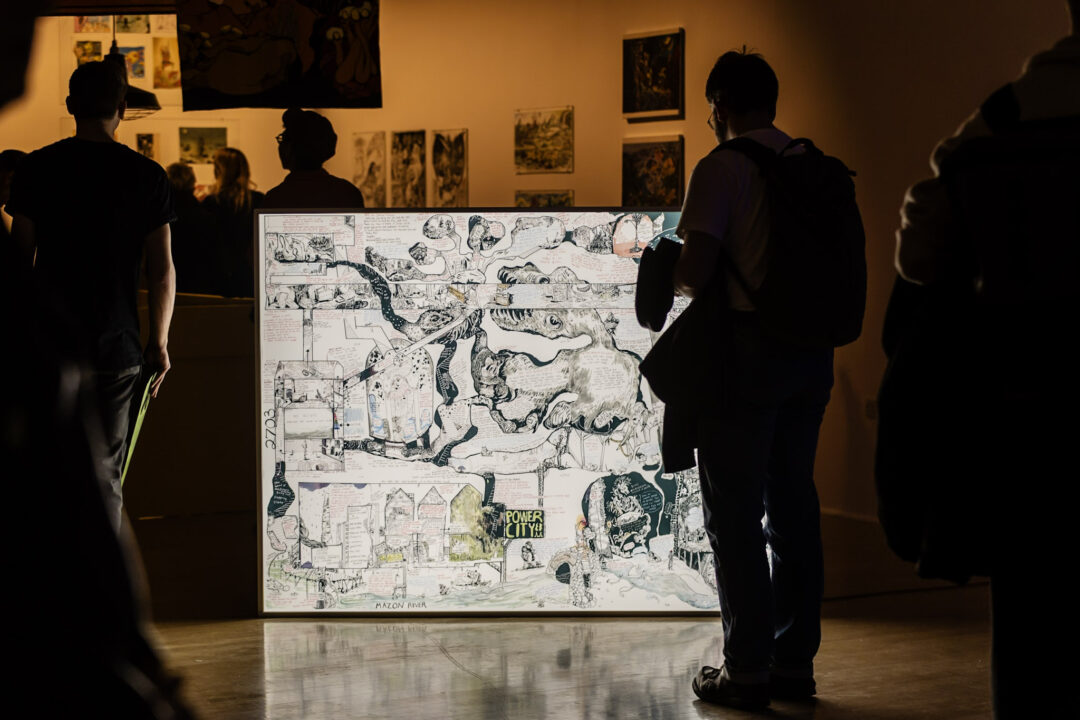
Join us for the launch of a new solo exhibition by Motunrayo Akinola and our Vitrines collaboration with The Aimless Archive.
We’re delighted to be launching two exhibitions in January, and this is your opportunity to come along for a first look around. Enjoy a free welcome drink, delicious food (first come, first served!) and music.
All welcome but reserve your free ticket to avoid disappointment.
Motunrayo Akinola: Knees Kiss Ground
We’re delighted to present Knees Kiss Ground, a solo exhibition by artist Motunrayo Akinola, which explores faith and belonging through everyday objects.
The exhibition was produced during a six-month residency Motunrayo secured at South London Gallery (SLG) as part of their Postgraduate Residency scheme. The scheme provides early-career artists with the rare opportunity to produce a new body of work. Knees Kiss Ground was first exhibited at SLG in 2024 and tours to Bonington Gallery in 2025.
Vitrines #26: The Aimless Archive
Hull based The Aimless Archive delivers the 26th instalment of our Vitrines programme.
The Aimless Archive works across text – conversation – performance – collecting. It questions what we keep and what we get rid of by investigating the processes used to build archives. This approach attempts to be as open and collaborative as it can be. Work often takes the form of a book – a box – a by-product.






























This event is now fully booked. Those without a ticket may not be admitted.
Join us for the launch of a new exhibition featuring over 120 works by contemporary working-class artists and photographers.
Curated by photographer, writer and broadcaster Johny Pitts, After the End of History emphasises the perspectives of practitioners who turn their gaze towards both their communities and outwards to the wider world. Find out more.
‘After the End of History: British Working Class Photography 1989 – 2024’ is a Hayward Gallery Touring exhibition curated by Johny Pitts with Hayward Gallery Touring.

































Dr Paul Adey is a HE lecturer of Music Performance and Music Business at Confetti Institute of Technologies.
Performing under the artist name of Cappo, he has practiced hip hop lyricism for over two decades. During this time, he has had the privilege of appearing at many of Europe’s premier live music venues, performing alongside artists such as Public Enemy, Skepta, and The Sleaford Mods.
Throughout his career, he has released music on various record labels including Tru-Thoughts and Ninja Tune, and featured live on BBC Radio One (John Peel), BBC Radio 1 Xtra, and BBC Radio 6 numerous times.
Paul’s interdisciplinary research focuses on popular culture, literary devices and musical concepts such as intertextuality and allusion, and the semianalysis of song lyrics. The interdisciplinary nature of Paul’s research links his work to Music, English, Creative Writing, and media studies.
Instagram: @kafka_poe_murakami
X: @CAPPO_GENGHIS
Linktr.ee: @_Cappo_
Claude Money is a record producer and PhD researcher from Nottingham via Singapore and Spain.
Based at Sirkus Studios, he’s been known to work on projects of all genres, but is consistently influenced by the stylings and history of Library Music, Soul, Jazz and Hip-Hop, as well as the traditional folk music of his broad and eclectic cultural background.
Outside of the record industry, he produces music for the screen. He has created bespoke pieces for the BFI and Netflix as well as BBC’s Inside Out, London Fashion Week and the Sailing Grand Prix.
Since 2016, He’s produced a wide variety of tracks for artists including Pete Beardsworth, Emily Makis, Wariko, President T, Window Kid and Snowy. His breakout single was his remix of Misti Blu Two by Amillionsons featuring siblings Taka Boom, Chaka Khan and Mark Stevens, available now on vinyl via Amillionrecords.
Claude’s previous career as a journalist eventually led him to the world of live music. As a promoter he’s worked with headliners such as Hypnotic Brass Ensemble, Talib Kweli, Pharoahe Monch, Saul Williams, KRS One, Children of Zeus, The Pharcyde and Ghostface Killah.
His passion for the culture has now led him full circle. In October of 2024 Claude will begin a new role at the Nottingham Trent University Doctoral School as a researcher where he will be recording and transcribing the oral histories of Nottingham’s hidden Hip-Hop history, a previously unexplored and under-researched area of UK cultural history.
www.sirkus.co.uk
www.instagram.com/claudemoneyofficial
www.soundcloud.com/claudemoneyofficial
This free, online-in conversation event with writer Gogu Shyamala is part of our Formations series, hosted in partnership with Nottingham Trent University’s Postcolonial Studies Centre. This segment of Formations, CADALFEST, relates to the Celebrating Adivasi and Dalit Arts and Literature Festival (CADALFEST) taking place across India and in Nottingham. CADALFEST is the first international festival series dedicated to artists whose work creatively resists caste discrimination and social exclusion in India.
This event will take start at 4 pm (GMT) and 8.30 pm Indian Standard Time.
Gogu Shyamala will discuss her literary and academic work to mark the republication of her short story collection Father May be an Elephant, and Mother Only a Small Basket, But…, by Tilted Axis Press in March 2022. Her focus on the perspective of Dalit women and children as well as her stories’ celebration of Dalit strength and culture will be explored. Gogu Shyamala will tell us about her choice of, and experimentation with, the short story form, and how she sees her role as writer, academic and activist. We will also discuss land relations and the link to caste, sexual violence, inter-caste love and other key concerns of her fiction and academic writing.
Gogu Shyamala will be in conversation with Sowjanya Tamalapakula, Bethan Evans, Judith Misrahi-Barak and Nicole Thiara and the session will conclude with Q&A with the online audience via YouTube chat.
Tilted Axis is a non-profit press publishing mainly work by Asian writers, translated into a variety of Englishes. Founded in 2015, Tilted Axis are based in the UK, a state whose former and current imperialism severely impacts writers in the majority world. This position informs their practice, which is also an ongoing exploration into alternatives – to the hierarchisation of certain languages and forms, including forms of translation; to the monoculture of globalisation; to cultural, narrative, and visual stereotypes; to the commercialisation and celebrification of literature and literary translation. Tilted Axis values the work of translation and translators through fair, transparent pay, public acknowledgement, and respectful communication. They are dedicated to improving access to the industry, through translator mentorships, paid publishing internships, open calls and guest curation.
Dr. Gogu Shyamala is one of the foremost contemporary Dalit writers in India, as an author, researcher, editor, and biographer writing in Telugu.
Her English collection of short stories, Father may be an elephant and mother only a small basket, but… is a landmark in Indian literature; the collection was also translated into German and some of the short stories into French. She produced an anthology known as Nallapoddu (Black Dawn), which is a collection of 51 Dalit women’s writings (from 1921 to 2002) from across the Telugu-speaking Indian federal states. It has one of critical acclaim in literary world. She wrote a biography of the first Dalit woman legislator, Cabinet member and Endowment Minister in the former state of Andhra Pradesh, India. She worked on domestic violence and Dalit women. She is the co-editor of Anthology of Dalit writing in Telugu published by Oxford University Press. She has participated in the World Conference against Racism, and in literary events in Australia, Germany and Jaipur. Mentoring rural students on access to Higher Education and researching specific causes for dropouts, Gogu Shyamala also made documentary film called Memetla Saduvaale (Merit Interrupted).
Her writings are part of the syllabus in higher education in several Indian states and as well as the University of San Francisco in the USA. Her writings were translated into Indian languages such as Tamil, Malayalam, Hindi, Urdu and Gujarati. She holds a PhD in the area of Dalit Women Biographies, Gender and Caste in Telangana, from the English and Foreign Languages University, Hyderabad. She received several awards including Gandapenderam, she been worked as Research Fellow at Anveshi and as residence fellow at IEA Nantes in France on Dalit folklore and art farms. At present she is working as an independent scholar researching and writing biographies of rural Dalit women. She studies Dalit women’s literature and the history and mythology of Dalit literature as well as collecting palm leaf manuscripts of Dalit Puranas for contemporary scholarly studies.
Sowjanya Tamalapakula holds a PhD in the area of Violence, Gender and Caste from the English and Foreign Languages University, Hyderabad.
Areas of study include gender and intersectionalities with particular emphasis on the issues of Dalit women. She is currently teaching and guiding in the School of Gender Studies at Tata Institute of Social Sciences, Hyderabad. She teaches intersectionalities, sexuality, cinema, media and women’s writing for post-graduate students. She has published in various national and inter-national journals on gender, caste, cinema and media. Her recent paper ‘Caste-ing Queer Identities’ published in NUJS-Law Review journal is a critique on how caste operates in the queer intimate spaces.
Another paper titled ‘Politics of Inter-caste Marriage among Dalits: “Political as Personal”’ has been published in Asian Survey, University of California, Berkeley. She has been invited to contribute a paper ‘“Whatever Happened to Jogta, Jogtin?: Instrumentality of Religion in non-Brahman Cultural Assertion and Marginalization of Dalits’ for the Journal of Critical Philosophy of Race, Penn State University. She contributes regularly to Asian Age, Deccan Chronicle, The Wire, The News Minute, The Citizen, The Print, Youth Ki Awaz, Velivada and Roundtable India.
Bethan Evans is a recently qualified Doctor of Philosophy in English, specialising in black British literature, specifically the black British short story and its position in the publishing industry. Her thesis is titled ‘Publishing Black British Short Stories: The Potential and Place of a Marginalised Form’. Bethan has written articles for the Literary Encyclopedia and the Routledge Companion to Literature and Feminism, and is currently co-editing a special issue of the Journal of Postcolonial Writing, due for publication in 2025. She is the Project Officer for ‘On Page and On Stage: Celebrating Dalit and Adivasi Literatures and Performing Arts’.
Judith Misrahi-Barak is Associate Professor at University Paul Valéry Montpellier 3, France, where she teaches English and postcolonial literatures. Her prime areas of specialization are Caribbean and Indo- and Sino-Caribbean literatures in English, diaspora and migrant writing. She has published numerous articles and book chapters in edited collections, among which Tracing the New Indian Diaspora (Om Dwivedi, ed. Rodopi, 2014); Turning Tides: Caribbean Intersections in the Americas and Beyond (Heather Cateau and Milla Riggio, eds. Kingston, Jamaica: Ian Randle Publishers, 2019); or Windrush (1948) and Rivers of Blood (1968): Legacy and Assessment (Trevor Harris, ed. Routledge, 2019). She is General Editor of the series PoCoPages (Pulm, Montpellier). Borders and Ecotones in the Indian Ocean is the latest volume (2020).
http://www.pulm.fr/index.php/collections/horizons-anglophones/pocopages.html
Her latest publications are a chapter on Edwidge Danticat’s short stories (Bloomsbury Handbook on Edwidge Danticat, 2021), an article in a special issue of The Caribbean Quarterly on Sino-Caribbean literature (2021), and Kala pani Crossings: Revisiting 19th century Migrations from India’s Perspective (co-edited with Ashutosh Bhardwaj, Routledge, 2021).
Her monograph entitled Entre Atlantique et océan Indien: les voix de la Caraïbe anglophone was published with Classiques Garnier (Paris, 2021).
Dalit literatures are among her more recent interests, and she was Co-Investigator on an AHRC Research Network series on ‘Writing, Analysing, Translating Dalit Literature’ (2014-16) and is now Co-Investigator on an AHRC Follow-on Funding for Impact and Engagement on ‘On Stage and on Page: Celebrating Dalit and Adivasi Literatures and Performing Arts’ (2020-23).
Caste in Cinema, co-edited with Joshil K. Abraham, is forthcoming with Routledge (November 2022).
Nicole Thiara is Co-Director of Nottingham Trent University’s Postcolonial Studies Centre and Principal Investigator on the AHRC-funded Research Network Series, ‘Writing, Analysing, Translating Dalit Literature’ and its Follow-on Grant ‘On Page and on Stage: Celebrating Dalit and Adivasi Literatures and Performing Arts’.
She teaches Postcolonial and Contemporary Literature at Nottingham Trent University, UK. Her area of research is Dalit and diasporic South Asian literature and her current research project is the representation of modernity in Dalit literature.
Her publications include Salman Rushdie and Indian Historiography: Writing the Nation into Being (Palgrave Macmillan, 2009), ‘The Colonial Carnivalesque in Mulk Raj Anand’s Untouchable and Amitav Ghosh’s Sea of Poppies’, Journal of Postcolonial Writing 52: 6 (2016), ‘Subaltern Experimental Writing: Dalit Literature in Dialogue with the World’, Ariel 47:1-2 (2016), pp. 253-80, and with Annapurna Waughray, ‘Challenging Caste Discrimination with Literature and Law: An Interdisciplinary Study of British Dalit Writing’, Contemporary South Asia 21:2 (2013), pp. 116-32. With Judith Misrahi-Barak and K. Satyanarayana, she co-edited the critical volume Dalit Text: Aesthetics and Politics Re-imagined (Routledge, 2019) and special issue on Dalit Literature in the Journal of Commonwealth Literature 54 (1), March 2019 with our Open Access editorial ‘Why Should We Read Dalit Literature’ accessible here.



This free, online-in conversation event with multimedia artists Subash Thebe Limbu and Osheen Siva is part of our Formations series, hosted in partnership with Nottingham Trent University’s Postcolonial Studies Centre. This segment of Formations, CADALFEST, relates to the Celebrating Adivasi and Dalit Arts and Literature Festival (CADALFEST) taking place across India and in Nottingham. CADALFEST is the first international festival series dedicated to artists whose work creatively resists caste discrimination and social exclusion in India.
This event will be streamed live on Bonington Gallery’s YouTube channel. Book your free place now.
In recent times, the rapidly changing socio-political, environmental, and technological changes have centralised focus on reimagining and reconfiguring futures. While the Futurism movement, which began in Italy and spread to other European countries, sought to cleave off from the past and prophesized exciting futures through new technologies, futurisms that emerged from the margins were motivated by different urges – to question Eurocentric ideas of progress, development, scientific rationality, and techno futures. Afrofuturism, Latinx Futurism, and different kinds of Subaltern Futurisms have imagined alternate futures through speculative art and fiction by firmly holding on to the past.
In the Indian subcontinent, artists Subash Thebe Limbu and Osheen Siva have conceptualised Adivasi Futurism and Tamil Dalit Futures respectively. This conversation will discuss how they utilise the anti-caste philosophy that guides their multimodal artwork. It will explore how the artists use speculative art to posit alternate futures that resist caste and privilege their identities. The conversation, moderated by Prof. K.A. Geetha and Priteegandha Naik will discuss Dalit and Adivasi futurism and the potential it offers to dream up new and equal futures.
Subash Thebe Limbu is a Yakthung (Limbu) artist from what we currently know as eastern Nepal. He works with sound, film, music, performance, painting and podcast.
Subash has an MA in Fine Art from Central Saint Martins (2016), a BA in Fine Art from Middlesex University (2011), and an Intermediate in Fine Art from Lalit Kala Campus, Kathmandu.
His works are inspired by socio-political issues, resistance and science/speculative fiction. Indigeneity, climate change, and Adivasi Futurism are recurring themes in his works.
He is based in Newa Nation (Kathmandu) and London.
Osheen Siva is a multidisciplinary artist from Thiruvannamalai, currently based in Goa. Through the lens of surrealism, speculative fiction and science fiction and rooted in their Dalit and Tamil heritage, Siva imagines new worlds of decolonized dreamscapes, futuristic oasis with mutants and monsters and narratives of queer and feminine power.
K.A. Geetha is an Associate Professor the Department of Humanities and Social Sciences, BITS Pilani, Goa Campus, India. Her research interests are Dalit writing, Post-Colonial literatures, Women Studies and Cultural studies. She has worked extensively on the literary production and reception of Tamil Dalit literature.
Priteegandha Naik has submitted her thesis on Dalit-futurism which discussed Dalit Studies, Science Fiction Studies, Science and Technology Studies. She and is currently working as a Research Associate at Tata Institute of Social Sciences, Mumbai.



During the exhibition, students at Nottingham Trent University and visitors of the exhibition were invited to design their very own personalised monogram to be in with a chance of winning a limited edition print from the Alan Kitching Collection. The rules were simple; the monogram had to:
1) include your own initials
2) use one letter from the typefaces used in the Alan Kitching Collection. The subsequent letters could come from anywhere: another typeface, hand-drawn, a found letter…
3) be rendered in a way that it tells us something about the designer.
Entries were then uploaded with the hashtag #NTUmonogram to Twitter, Instagram or Facebook.
The competition ended on Sunday 18 October 2015, and the winner (selected by Alan Kitching himself) was announced on Thursday 22 October.
Read all about the winning entry and the runners-up in this story on our blog.
To find out more, read the full competition details.
Taking place in Nottingham Trent University’s Old Chemistry Theatre, the space is reduced to a minimal setting of a table and chair, a notebook laptop and the human body. The performance aims to create an intimacy with the viewer whilst allowing the interplay between what is real and the virtual world.
Notebook Series is collaboration between a choreographer, Colette Sadler and set-designer, Philine Rinnert. The reference to a notebook in the title reflects shared ongoing process and research. The notebook is both a holding structure and platform for the collaborative process in so far as it allows the laying out and organisation of images, texts and choreographic notes or studies differently from those suggested by real time and space.
In a situation reminiscent of a lecture or public speech, the performance questions the identity of the performer. Moving between the real and the fictional in a clinical deconstruction and disassociation of the human body and its senses, the performance asks “What are you” and “Who are you” in an investigation of the human capacity for transformation and the possibility of living beyond the self.
For full details please visit the Dance4 What’s On pages
Notebook Series is part of the Nottdance Festival 2015. The festival runs from the 5 – 15 March with over 40 performances taking place over 11 days, across more than 20 venues and public spaces.
Download the full NottDance Festival programme here.

The Crafting Anatomies project places the human body at the centre of a multi-disciplinary dialogue; exploring how this entity has been interpreted, crafted and re-imagined in historical, contemporary and future contexts.
This one-day symposium will explore the curious practices of a selection of Crafting Anatomies’ exhibitors, highlighting a preoccupation with the human condition in a breadth of exploratory contexts.
Delegates will also have the opportunity to visit the Crafting Anatomies exhibition in conjunction with this event and see ocularist and Crafting Anatomies exhibitor, John Pacey-Lowrie, as he demonstrates his craft of creating prosthetic eyes.
© Marloes ten Bhömer Courtesy Stanley Picker Gallery
